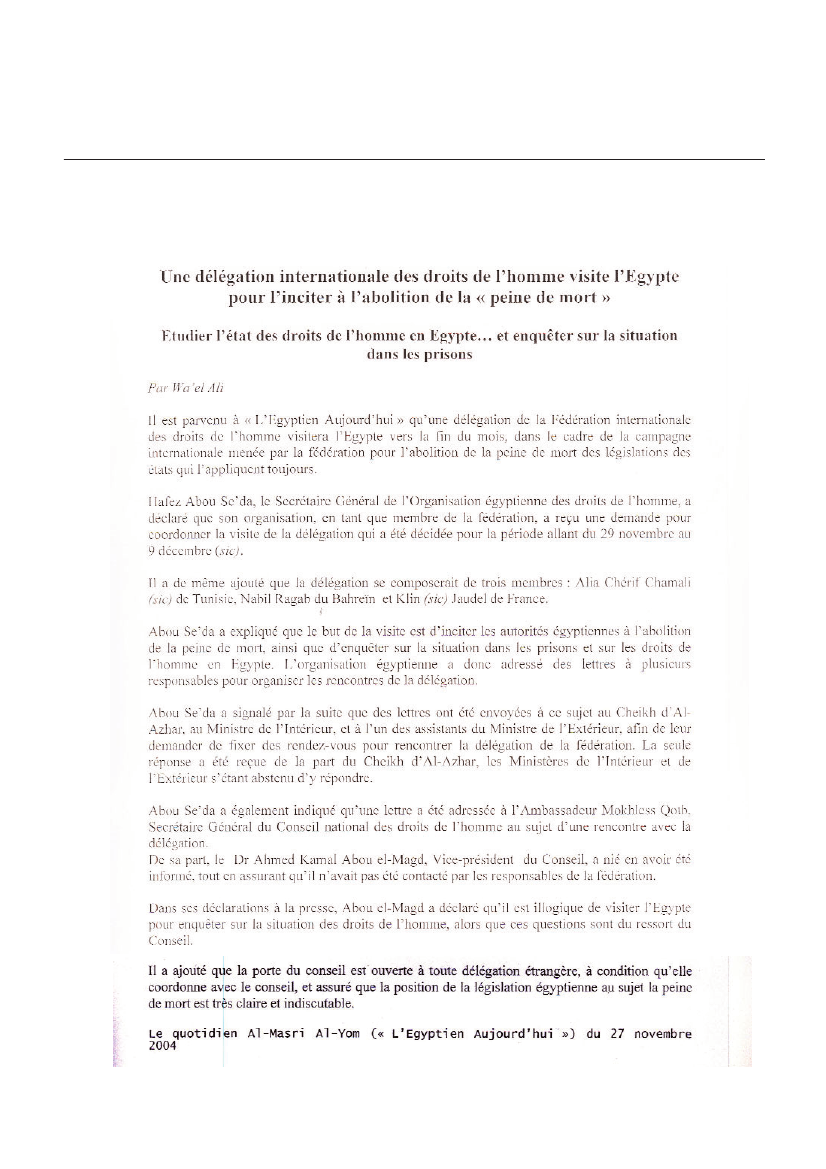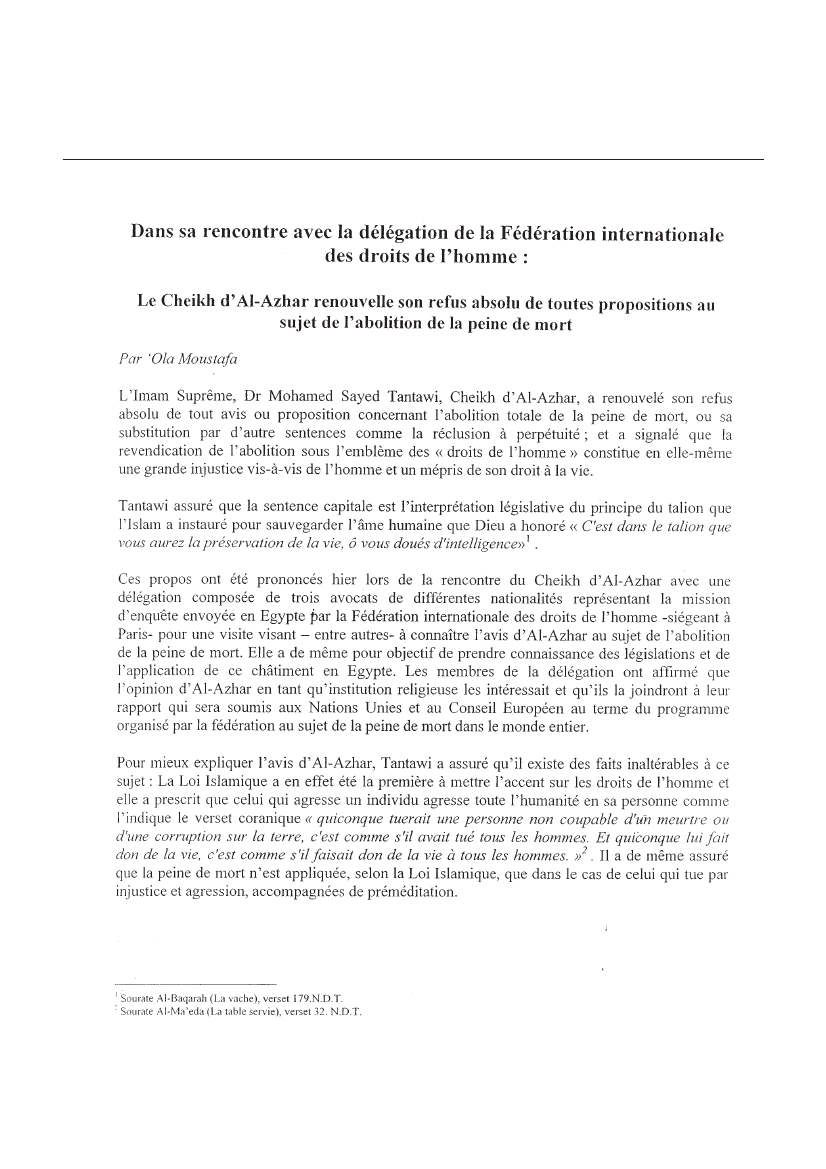Det Udenrigspolitiske Nævn 2004-05 (2. samling)
Bilag 22
Offentligt
n� 415/2April 2005International Federation for Human Rights
ReportInternationalFact-findingMission
The Death Penalty in Egypt
FOREWORD: WHY MOBILISE AGAINST THE DEATH PENALTY . . . . . . . . . . . . . . . . . . . . . . . . . . . . . . . . . . . . . . . . . . . . . 4I. INTRODUCTION AND THE DEATH PENALTY SITUATION IN EGYPT . . . . . . . . . . . . . . . . . . . . . . . . . . . . . . . . . . . . . . . . . 7II. THE LEGAL CONTEXT . . . . . . . . . . . . . . . . . . . . . . . . . . . . . . . . . . . . . . . . . . . . . . . . . . . . . . . . . . . . . . . . . . . . . . . . . . 11III. ARREST AND DETENTION . . . . . . . . . . . . . . . . . . . . . . . . . . . . . . . . . . . . . . . . . . . . . . . . . . . . . . . . . . . . . . . . . . . . . 20IV. CONCLUSION AND RECOMMENDATIONS . . . . . . . . . . . . . . . . . . . . . . . . . . . . . . . . . . . . . . . . . . . . . . . . . . . . . . . . . 26V. APPENDICES . . . . . . . . . . . . . . . . . . . . . . . . . . . . . . . . . . . . . . . . . . . . . . . . . . . . . . . . . . . . . . . . . . . . . . . . . . . . . . . . 28
The Death Penalty in Egypt
TABLE OF CONTENTSFOREWORD: WHY MOBILISE AGAINST THE DEATH PENALTY . . . . . . . . . . . . . . . . . . . . . . . . . . . . . . . . . . . . . . . . . . . . . 41. The death penalty contradicts human dignity and liberty . . . . . . . . . . . . . . . . . . . . . . . . . . . . . . . . . . . . . . . . . . . . . . . . 42. The death penalty is useless . . . . . . . . . . . . . . . . . . . . . . . . . . . . . . . . . . . . . . . . . . . . . . . . . . . . . . . . . . . . . . . . . . . . . . 53. Arguments from international human rights law . . . . . . . . . . . . . . . . . . . . . . . . . . . . . . . . . . . . . . . . . . . . . . . . . . . . . . . 5I. INTRODUCTION AND THE DEATH PENALTY SITUATION IN EGYPT . . . . . . . . . . . . . . . . . . . . . . . . . . . . . . . . . . . . . . . . . 71. Aim and progress of the mission . . . . . . . . . . . . . . . . . . . . . . . . . . . . . . . . . . . . . . . . . . . . . . . . . . . . . . . . . . . . . . . . . . . 72. General considerations . . . . . . . . . . . . . . . . . . . . . . . . . . . . . . . . . . . . . . . . . . . . . . . . . . . . . . . . . . . . . . . . . . . . . . . . . . . 8a. The application of the Sharia . . . . . . . . . . . . . . . . . . . . . . . . . . . . . . . . . . . . . . . . . . . . . . . . . . . . . . . . . . . . . . . . . . . . . . 8b. The state of emergency. . . . . . . . . . . . . . . . . . . . . . . . . . . . . . . . . . . . . . . . . . . . . . . . . . . . . . . . . . . . . . . . . . . . . . . . . . . 9c. Number of sentences and executions . . . . . . . . . . . . . . . . . . . . . . . . . . . . . . . . . . . . . . . . . . . . . . . . . . . . . . . . . . . . . . . 9II. THE LEGAL CONTEXT . . . . . . . . . . . . . . . . . . . . . . . . . . . . . . . . . . . . . . . . . . . . . . . . . . . . . . . . . . . . . . . . . . . . . . . . . . 111. The Constitution . . . . . . . . . . . . . . . . . . . . . . . . . . . . . . . . . . . . . . . . . . . . . . . . . . . . . . . . . . . . . . . . . . . . . . . . . . . . . . . 112. Crimes punishable by the death penalty . . . . . . . . . . . . . . . . . . . . . . . . . . . . . . . . . . . . . . . . . . . . . . . . . . . . . . . . . . . . 123. The administration of justice and death sentences . . . . . . . . . . . . . . . . . . . . . . . . . . . . . . . . . . . . . . . . . . . . . . . . . . . 13a. The common law courts . . . . . . . . . . . . . . . . . . . . . . . . . . . . . . . . . . . . . . . . . . . . . . . . . . . . . . . . . . . . . . . . . . . . . . . . . 13b. The special courts . . . . . . . . . . . . . . . . . . . . . . . . . . . . . . . . . . . . . . . . . . . . . . . . . . . . . . . . . . . . . . . . . . . . . . . . . . . . . . 16III. ARREST AND DETENTION . . . . . . . . . . . . . . . . . . . . . . . . . . . . . . . . . . . . . . . . . . . . . . . . . . . . . . . . . . . . . . . . . . . . . 201. Places and conditions of detention . . . . . . . . . . . . . . . . . . . . . . . . . . . . . . . . . . . . . . . . . . . . . . . . . . . . . . . . . . . . . . . . 202. Administrative arrests in terms of the emergency law . . . . . . . . . . . . . . . . . . . . . . . . . . . . . . . . . . . . . . . . . . . . . . . . . . 203. Interrogation procedures in places of detention. . . . . . . . . . . . . . . . . . . . . . . . . . . . . . . . . . . . . . . . . . . . . . . . . . . . . . . 21a. Torture leading to death . . . . . . . . . . . . . . . . . . . . . . . . . . . . . . . . . . . . . . . . . . . . . . . . . . . . . . . . . . . . . . . . . . . . . . . . . 21b. Impunity for and obstacles preventing the prosecution of those responsible for acts of torture . . . . . . . . . . . . . . . . . 21c. Types of torture . . . . . . . . . . . . . . . . . . . . . . . . . . . . . . . . . . . . . . . . . . . . . . . . . . . . . . . . . . . . . . . . . . . . . . . . . . . . . . . . 22d. Admissibility of confessions obtained under torture. . . . . . . . . . . . . . . . . . . . . . . . . . . . . . . . . . . . . . . . . . . . . . . . . . . . 224. Death row . . . . . . . . . . . . . . . . . . . . . . . . . . . . . . . . . . . . . . . . . . . . . . . . . . . . . . . . . . . . . . . . . . . . . . . . . . . . . . . . . . . . 23a. The suffering of families . . . . . . . . . . . . . . . . . . . . . . . . . . . . . . . . . . . . . . . . . . . . . . . . . . . . . . . . . . . . . . . . . . . . . . . . . 24b. The execution . . . . . . . . . . . . . . . . . . . . . . . . . . . . . . . . . . . . . . . . . . . . . . . . . . . . . . . . . . . . . . . . . . . . . . . . . . . . . . . . . 24IV. CONCLUSION AND RECOMMENDATIONS . . . . . . . . . . . . . . . . . . . . . . . . . . . . . . . . . . . . . . . . . . . . . . . . . . . . . . . . . 26V. APPENDICES . . . . . . . . . . . . . . . . . . . . . . . . . . . . . . . . . . . . . . . . . . . . . . . . . . . . . . . . . . . . . . . . . . . . . . . . . . . . . . . . 281. List of persons with whom the FIDH delegation met . . . . . . . . . . . . . . . . . . . . . . . . . . . . . . . . . . . . . . . . . . . . . . . . . . . 282. Articles published (in translation in French) on the mission of the FIDH delegation . . . . . . . . . . . . . . . . . . . . . . . . . . . 293. Protest in FIDH Press Release of 9 December 2004. . . . . . . . . . . . . . . . . . . . . . . . . . . . . . . . . . . . . . . . . . . . . . . . . . . 33
This report was elaborated with the support of the European Commission(European Initiative for Democracy and Human Rights- EIDHR) and the Fund for FIDH Missions.The opinions expressed in this document are those of the FIDH only and can not be attributedto the European Union.
FIDH / PAGE 3
The Death Penalty in Egypt
FOREWORD: WHY MOBILISE AGAINST THE DEATH PENALTYThe FIDH strongly opposes the death penalty. The FIDHmaintains that the death penalty contradicts the veryessence of the notion of human dignity and liberty;furthermore, it has by now proven its utter uselessness as adeterrent. Hence neither principles nor utilitarianconsiderations can justify upholding capital punishment.death."In this case, "society as a whole - i.e. all of us - inwhose name the verdict was reached becomes collectivelyguilty because its justice system has made the supremeinjustice possible" said R. Badinter, French Minister of Justice,in 1981. For a society as a whole, accepting the possibility ofcondemning innocent people to death flies in the face of itscore principles of inalienable human dignity, and of the mereconcept of justice.Justice is based on human rights guarantees:the existenceof human rights guarantees is the distinctive character of areliable judicial system; notably, these include the guaranteesarising from the right to a fair trial - including e.g. the rejectionof proofs obtained through torture or other inhumantreatments. In that perspective, the FIDH is convinced that thefull respect of those human rights guarantees and therejection of legally sanctioned violence are at the core of thecredibility of any criminal justice system. Justice, especiallywhen the gravest crimes are concerned and life is at stake,should not rely on chance and fortune; an individual's lifeshould not depend on random elements such as the juryselection, media pressure, the competence of a defenceattorney, etc… The rejection of inhuman sentences, and firstand foremost the death penalty, clearly contributes to buildinga judicial system on universally acceptable principles, whichis free of vengeance and which the population as a whole cantrust.The"death row phenomenon"refers to the conditions ofdetention of a person condemned to capital punishmentwhile awaiting the execution of the sentence. Theseconditions of detention - due notably to their very longduration, to the total isolation in individual cells, to theuncertainty of the moment of the execution, to deprivation ofcontacts with the outside world, including sometimes familymembers and legal counsel - often amount to inhumantreatment.Justice is fundamentally different from vengeance.Thedeath penalty is nothing but a remnant of an old systembased on vengeance: that s/he who has taken a life shouldsuffer from the same fate. If applied consistently, this wouldmean stealing from the stealer, torturing the torturer, rapingthe rapist. Justice has risen above such a traditional notion ofpunishment by adopting a principle of a symbolic, yetproportional sanction to the harm done - fines, imprisonment,etc., which preserves the dignity of both victim and culprit.
1. The death penalty contradicts human dignityand libertyHuman rights and human dignity are now universallyacknowledged as the supreme principles and as absolutenorms in any politically organised society. The death penaltydirectly contradicts this very premise and is based on amisconception of justice.Justice is based on freedom and dignity:a criminal can andshould be punished because s/he freely committed an actdisruptive of legal order. It is the very reason why children, orinsane persons cannot be held responsible for their actions ina criminal justice system. The death penalty is a contradictionin terms, since it means that at the very moment ofconviction, when the criminal is held responsible, and is thusconsidered as having acted freely and consciously, s/he isbeing denied this very freedom because the death penalty isirreversible. Human freedom is indeed also defined as thepossibility to change and improve the orientation of one'sexistence.The irreversibility of the death penalty contradicts the ideathat criminals can be rehabilitated and resocialised. Theirreversibility of the death penalty thus simply contradicts thenotion of freedom and dignity.The irreversibility argument has another aspect. Even in themost sophisticated legal system, garnished with the strongestarray of judicial safeguards and guarantees of due process,the possibility of miscarriages of justice always remains.Capital punishment can result in the execution of innocentpeople. This is the very reason why Governor Ryan, afterhaving discovered that thirteen detainees awaiting executionwere innocent of the crimes they had been accused of,decided to impose a moratorium in Illinois, and in January2003, commuted 167 death sentences to life imprisonment.The report of the Commission stressed that:"no system, givenhuman nature and frailties, could ever be devised orconstructed that would work perfectly and guaranteeabsolutely that no innocent person is ever again sentenced to
FIDH / PAGE 4
The Death Penalty in Egypt
Furthermore,the FIDH does not believe in the supposednecessity of the death penalty out of regard for the victimsand their relatives.The FIDH reaffirms that the victim’s rightto justice and compensation is fundamental in a balancedand fair justice system, and that the solemn and publicconfirmation by a jurisdiction of criminal responsibility andthe suffering of the victim play an important role in order tosubstitute the need for vengeance ("judicial truth"). But theFIDH nonetheless holds that answering this call for justice bythe death penalty serves only to relieve the basest emotionalcries for vengeance, and does not serve the cause of justiceand dignity (even that of the victims) as a whole.Paradoxically, the victims' dignity is itself better served byrising above vengeance. The victim's status of civil party in thecriminal procedure contributes to answering his/herimperious need to be recognised as a victim. Providingpsychological support and financial compensation to thevictims also contributes to their feeling that justice has beendone and that private vengeance is unnecessary and wouldhave no added value. In light of those elements, the need ofvictims to vengeance as an argument in favour of the deathpenalty appears irrelevant.Eventually, the FIDH notes that the death penalty is used in adiscriminatory way, e.g. in the USA, where it particularlyaffects ethnic minorities, or in Saudi Arabia where foreignersare its first victims.
criminality has repeatedly been proved wrong. All systematicstudies show that death penalty never contributes to loweringthe crime rate, anywhere. In Canada for example, thehomicide rate per 100,000 population fell from a peak of3.09in 1975, the year before the abolition of the deathpenalty for murder, to2.41in 1980. In 2000, whereas policein the United States reported 5.5 homicides for every100,000 population, the Canadian police reported1.8.The most recent survey of research on this subject, conductedby Roger Hood for the United Nations in 1988 and updated in2002, concluded that "the fact that the statistics... continueto point in the same direction is persuasive evidence thatcountries need not fear sudden and serious changes in thecurve of crime if they reduce their reliance upon the deathpenalty ".1This should obviously not come as a surprise: a criminal doesnot commit a crime by calculating the possible sanction, andby thinking that he will get a life sentence rather than thedeath penalty. Furthermore, as Beccaria noted in the 18thcentury, "it seems absurd that the laws, which are theexpression of the public will, and which hate and punishmurder, should themselves commit one, and that to detercitizens from murder, they should decree a public murder".Finally, the FIDH notes that the death penalty is very often abarometer of the general human rights situation in thecountries concerned: it proves to be a reliable indicator of thelevel of respect for human rights, e.g. the situation of humanrights defenders.
2. The death penalty is uselessAmong the most common arguments in favour of the deathpenalty, one hears that of its usefulness: the death penaltysupposedly protects society from its most dangerouselements, and acts as a deterrent for future criminals. Noneof these arguments can be held to have any validity, as hasbeen proven again and again.1.Is the death penalty a protective element for society?Itdoes not appear so: not only are societies which enact capitalpunishment usually no less protected from crime thansocieties which do not, but other sanctions are available inorder to protect society, notably imprisonment: protection ofsociety does not imply the physical elimination of criminals. Inaddition, it can be argued that the precautions taken to avoidsuicide by death row inmates demonstrate that the physicalelimination of the criminal is not the main aim of deathpenalty: what seems to matter is that the sanction is executedagainst the consent of the criminal.2. With regard to theexemplarityof the death penalty orother cruel punishments, their efficiency as deterrents for
3. Arguments from international human rightslawThe evolution of international law tends towards the abolitionof the death penalty: the Rome Statute of the InternationalCriminal Court and the UN Security Council resolutionsestablishing the International Criminal Tribunals for theFormer Yugoslavia and for Rwanda do not provide for thedeath penalty in the range of sanctions although thosejurisdictions have been established to try the most seriouscrimes.Specific international and regional instruments have beenadopted which aim at the abolition of the capital punishment:the UN second optional protocol to the ICCPR aiming at theabolition of the death penalty, the Protocol to the AmericanConvention on Human Rights to abolish the death penalty(Organisation of American States), the Protocol 6 and the newProtocol 13 to the European Convention on Human Rights
FIDH / PAGE 5
The Death Penalty in Egypt
(Council of Europe). The Guidelines to EU Policy Towards ThirdCountries on the Death Penalty, adopted by the EuropeanUnion on 29 June 1998 stress that one of the EU objectivesis "to work towards the universal abolition of the death penaltyas a strongly held policy view agreed by all EU memberstates". Moreover, "the objectives of the European Union are,where the death penalty still exists, to call for its use to beprogressively restricted and to insist that it be carried outaccording to minimum standards (…). The EU will make theseobjectives known as an integral part of its human rightspolicy". The newly adopted EU Charter of Fundamental Rightsalso states that "no one shall be condemned to the deathpenalty, or executed".At the universal level, even if the ICCPR expressly provides forthe death penalty as an exception to the right to life andsurrounds it by a series of specific safeguards, the GeneralComment adopted by the Committee in charge of theinterpretation of the Covenant states very clearly that article6 on the right to life "refers generally to abolition in termswhich strongly suggest that abolition is desirable… allmeasures of abolition should be considered as progress inthe enjoyment of the right to life".Moreover, in its Resolution 1745 of 16 May 1973, theEconomic and Social Council invited the Secretary General tosubmit to it, at five-year intervals, periodic updated andanalytical reports on capital punishment. In its Resolution1995/57 of 28 July 1995, the Council recommended that thequinquennial reports of the Secretary General should alsocover the implementation of the safeguards guaranteeingprotection of the rights of those facing the death penalty.2Every year since 1997, the UN Commission on Human Rights
has called upon all states that still maintain the death penalty"to establish a moratorium on executions, with a view tocompletely abolishing the death penalty".3On 8 December 1977, the UN General Assembly also adopteda resolution on capital punishment stating that "the mainobjective to be pursued in the field of capital punishment isthat of progressively restricting the number of offences forwhich the death penalty may be imposed with a view to thedesirability of abolishing this punishment".4
"The greatest suffering known to man is not the pain ofinjury but that of a man who knows that in one hour,ten minutes, thirty seconds or immediately,his soul will depart his body He will no longer be a humanbeing, and this is final."Fedor Dostoïevski (1821-1881),Crime and Punishment,1866
1. Roger Hood,The Death Penalty: A Worldwide Perspective,Oxford University Press, Third Edition, 2002, p. 214.2 ECOSOC Resolution 1984/50 of 25 May 1984.3. See notably resolutions 2002/77, 2001/68, 2000/65 and 1999/61.4. UNGA Resolution 32/61, 8 Dec. 1977, para 1.
FIDH / PAGE 6
The Death Penalty in Egypt
I. INTRODUCTION AND THE DEATH PENALTY SITUATION IN EGYPT1. Aim and progress of the missionAfter being alerted by its member organisations, the EOHR5and the HRAAP6, the FIDH mandated an international missionof investigation to Egypt from 27 November to 6 December2004. The mission was composed of Alya Chérif Chammari, alawyer at the Bar of Tunis, Etienne Jaudel, former FIDHSecretary General and now FIDHchargé de mission,andNabeel Rajab, President of the Bahrain Center for HumanRights. The delegation stayed mainly in Cairo, but also visitedAlexandria and Mahalla, a small town 150 kilometres fromCairo.The arrival of the FIDH representatives had been announcedin the Egyptian press, which reported on the interviews thedelegation had with Sheik Muhammad Sayyid Tantawi andwith the Vice-President of the National Council for HumanRights. The content of these articles7shows the climate ofscepticism, hostility even, that has surrounded the FIDHinvestigation. Sheik Tantawi, Grand Imam of al-Azhar IslamicUniversity since 1996 and former Mufti of Egypt, has stronginfluence throughout the Islamic world. He violently opposesanyone who challenges the death penalty, which he deemsnecessary to maintain the social order, on the grounds of thecultural characteristics of the Muslim religion.The civil authorities, that the delegation called in vain,remained silent. FIDH delegates were only given theopportunity to interview a Deputy Minister of Justice. It provedimpossible to meet the Minister of the Interior, who isresponsible for everything relating to prisons and executions.On the pretext that the Minister was away, the visits requestedby the delegation to the death rows and the executionchambers were not authorised. Nor was the delegation ableto speak with the families of those condemned to death orexecuted. The only information it was able to gather arosefrom conversations with the lawyers of the condemnedprisoners or with prisoners who had seen the circumstancesof condemned persons in Egyptian prisons. It was notpossible to meet the President of the Bar either. The Ministryof Justice offered to give the FIDH delegation official statisticson the number of death sentences and the number ofexecutions but finally did not do so; the only figures thedelegation obtained were supplied by the Attorney Generalduring his interview with the delegation.So far as the religious authorities are concerned, SheikTantawi, after maintaining that "killing a human being isequivalent to attacking humanity as a whole", added thatanyone who has been killed unjustly, is entitled to theprotection of his and his children's rights. "This forces us topunish the unjust attacker, otherwise chaos will reign andpeople will kill each other. It is for Justice to punish anyonewho has unjustly killed his neighbour, by killing him also sothat equality and the human being are respected. If someonekills his neighbour, he will be killed himself. This is theguarantee of public security. We are protecting the rights ofthe murdered person".The delegation conducted about 30 interviews during its stayin Egypt. The Egyptian human rights organisations cooperatedin the investigation, in particular the Egyptian Organisation forHuman Rights and the Human Rights Association for theAssistance of Prisoners, both members of the FIDH. Howeverit turned out that the issue of the abolition of the deathpenalty "does not appear currently on the agenda". None ofthe interviewees believed that there was any chance of seeingthe death penalty abolished in the near future because of theprovisions of Islamic law and their interpretation by thereligious authorities. Moreover, they felt that there were moreimportant problems to be dealt with concerning human rightstoday in Egypt, in particular the condemnation of systematicuse of torture in State Security Services offices and policestations and the condemnation of the conditions of detentionin overcrowded prisons.During the FIDH delegation's stay, several investigativereports on repression following the September 2004 attacksagainst tourists, most of them Israeli, in the Sinai, edited bydifferent human rights organisations, were published. Thesereports recording many testimonies instanced the arrest ofmore 3,000 people, a great number of whom were said tohave been tortured by the security forces. Several may havebeen hospitalised as a result of this ill-treatment. A greatnumber, apparently, are still being detained for administrativereasons; this is permitted because of the state of emergencywhich has been continuously in force since 1981.8Arbitrary arrests and administrative imprisonment withoutsentence, carried out under the emergency laws in force, areanother worrying issue for the human rights defenders, who ,for several years, have been demanding, in vain, return tolegality.
FIDH / PAGE 7
The Death Penalty in Egypt
Even if the activists themselves seem to believe that theproblem of the death penalty is not on today's agenda inEgypt, the initiative of the HRAAP is to be saluted, as it daredto organise on 11 September 2OO4 a symposium entitled:"Death penalty: between retention, contraction and abolition".More than twenty speakers took part in it, including lawyers,parliamentarians and Islamic scholars. The participants didnot agree on the abolition of the death penalty, but theydemanded nonetheless that civilians no longer be broughtbefore military tribunals, and that the number of crimespunishable by death be restricted "to the most serious ones",in accordance with the provisions of Article 6 of the 1966International Covenant on Civil and Political Rights, which hasbeen ratified by Egypt. Furthermore, they proposed theadoption of a two year moratorium on capital punishments.The implementation of a moratorium on executions has alsobeen called for by the African Commission for Human andPeoples' Rights in a resolution adopted on 15 November1999, which also urged the States to abolish the deathpenalty.This symposium, stigmatised by the religious authorities,shows that opinion is changing in Egypt on the matter of thedeath penalty. It seems moreover that it was the presence ofthe FIDH delegation which led to this issue being put on thecivil society agenda and being debated. This is a first step onthe road to its repeal.In addition, the issue of human rights is becoming moreimportant in the country. Much coverage is being given in thepress to the activities of human rights defenders and becauseof this, the practice of torture by the police is beingincreasingly challenged. Moreover, President Mubarak set upa National Council for Human Rights in June 2003.9Themembers of this Council were chosen for their experiencewith and interest in human rights. The chairman of the EOHR,member organisation of the FIDH is member of this Councilwhich is chaired by Mr Boutros Boutros-Ghali.The Council has received more than 2,000 complaints andhas announced the publication of a report on the humanrights situation in Egypt for the beginning of 2005. TheCouncil has been much criticised by several Egyptian humanrights organisations. Its lack of effectiveness andindependence considering its powers are the main criticism.Some of its members acknowledge this ineffectiveness andblame it on lack of cooperation from official bodies, and inparticular from the ministries, which have no legal obligationto collaborate with the Council, which, as a result, has no
authority.10
2. General considerationsTo tackle the question of the death penalty in Egypt, twocharacteristics of this country need to be taken into account:the importance of Islamic legislation and the state ofemergency in force since 1981.
a. The application of the ShariaIn accordance with Article 2 of the Egyptian Constitution, asamended in 1980: "Islam is the State religion and Arabic is itsofficial language. The Sharia is the principal source oflegislation."This formal confirmation is, according to everyone met by thedelegation, the main impediment to the abolition of the deathpenalty in Egypt today. In fact, according to the interpretationmade of it by those who claim to have authority in thisdomain, and in particular Sheik Tantawi, the law of Godrequires that intentional criminals be put to death. This is theprinciple of equality, thelex talionis.By satisfying the victims'feelings of revenge, the vicious circle is avoided and the socialpeace maintained. Since God decided this penalty, writes theEgyptian professor 'Abd al-'Al,11"man cannot be reproachedfor his cruelty". In his thesis on the death penalty, this authorcriticises the human rights defenders for attempting toimpose an ethic which is foreign to the Egyptian society."These rules are immutable", decreed the High ConstitutionalCourt in 1991, "and cannot be subject to interpretation. It istherefore inconceivable that their sense be modified byreason of time or place, since they defy any amendment andthey cannot be attacked".12The Court nonetheless believes that in the Sharia there are"relative" principles which are capable of being adjusted inaccordance with social development, which leaves someroom for future development.The most orthodox religious thinkers go as far as to demandthe restoration of the death penalty for all crimes stipulated inthe Koran, e.g. adultery and apostasy for a start. Some ofthem also demand the restoration of thediyyahwherebycriminals can be pardoned by their victim's family by givingthem compensation.In his interview with the delegation, Sheik Tantawi made itclear that "under Islamic law, the death penalty only applies to
FIDH / PAGE 8
The Death Penalty in Egypt
someone who has killed his neighbour unjustly and withpremeditation and who has confessed his crime. When theseconditions are all present and this penalty is applied, Justicereigns". "Human rights require the death penalty, otherwisewhat rights does a victim have?" he added. Then he askedAlya Chérif Chammari: "if someone kills your son and is nothimself killed, will you let him live ?" When he was told thatthe death of the murderer would not bring back the victim, heput this down to the lawyer's "female sensitivity".This orthodox thinking is being increasingly challenged by theadherents of a more liberal Islam who are now beginning tobe heard. According to these intellectuals, several of whomspoke at the symposium on the death penalty organised bythe HRAAP in September 2004, no-one has authority tointerpret officially the law of God, which should be interpretedin such a way as takes account of changing morals.It is however symptomatic that the human rights activists didnot manage, at the end of the symposium, to agree on theproposal to abolish capital punishment and were content withdemanding that it be restricted to "the most serious crimes".Some of them admitted that the time was not yet right forEgypt to join the abolitionist camp. But although agreementmay still be far away, the debate nevertheless continues, asproved by the symposium and by articles in the press whichrecount the debates between the advocates and opponentsof the removal of organs from the bodies of people sentencedto death.The Attorney General Maher Abdelwahed told the delegation :"the Egyptian Constitution refers to Islamic law, but we areendeavouring to restrict the application of the death penaltyto those crimes that affect society as a whole or that are atvariance with its foundations".It seems that the prospects of abolishing the death penalty inEgypt are still far-off. Egypt was one of the States opposed tothe resolution on the death penalty adopted on 21 April 2004by the U.N. Commission on Human Rights at its 60th sitting(by 28 votes to 20 with 5 abstentions). This resolutionrequires all the States which maintain this penalty to abolishit for once and for all, and in the meantime, to introduce amoratorium on executions.
originally due to last one year, has been extended every threeyears. The last time was in February 200314three monthsbefore it was supposed to end. By imposing restrictions interms of individual rights and freedoms, the state ofemergency leaves these rights and freedoms open to seriousviolations. In particular it authorises administrativeimprisonment, without judicial control and for periods whichcan be renewed indefinitely, of all persons who are believed tobe undermining the social order and security, a vague formulawhich leads to the arbitrary.In application of this emergency legislation, "special" courtssuch as the Emergency State Security Courts and theSupreme State Security Court of Emergency have been setup. These courts are made up of magistrates speciallyappointed by the President, who are officers subject tomilitary authority. There is no possible appeal against theirrulings. The only possible remedy is to present an individualpetition to the court (State Security or the Supreme Court)which delivered the judgment.The situation is different with regard to the military courtsbefore which civilians may be brought. There is no right ofappeal against the summary proceedings in these courts, theonly recourse is an appeal to the President who has nevergranted an appeal. According to the human rightsorganisations, more than 95 civilians have been sentenced todeath by military courts over the last fifteen years andexecuted shortly thereafter.For reasons of public security, only the President of theRepublic or persons appointed by him, have the power to referaccused persons to one of these special courts; even forcommon law crimes or offences. The President has resortedto this frequently over recent years, not only for those accusedof terrorism, but also for members of the Muslim Brothers orhomosexuals; all received harsh sentences from the Statesecurity courts.The question of the death penalty therefore arises inconditions which vary fundamentally depending on whether itis given by common law courts or by special courts subject toinordinate rules.
c. Number of sentences and executionsb. The state of emergencySince the assassination of President Anwar As-Sadat inOctober 1981, the state of emergency has been in force inEgypt.13The law on the state of emergency, which wasRegardless of whether they are delivered by special courts orcommon law courts, death sentences followed by executionsare frequent in Egypt today.
FIDH / PAGE 9
The Death Penalty in Egypt
It is impossible to obtain exact statistics to distinguishbetween death sentences and executions, which often takeplace a long time after the pronouncement of the sentence.The FIDH mission however was able to gather some figures.Between 1991 and 2000, the criminal divisions of the courtsof appeal sentenced 530 people to death and, in 1999 alone,108 sentences were pronounced including 12 againstwomen.15According to the official announcements by the Egyptiangovernment to the United Nations Human Rights Committee,the number of executions in 1999 was 25 and 30 in 2000.The Attorney General added to this list verbally at an interviewhe gave to the representatives of the FIDH mission, byexplaining that : 28 executions took place in 2001; 49in 200216; and 36 in 2003. The statistics for 2004 are not yetavailable.It has been impossible to discover the exact number ofsentences passed during this period as this would involve,according to the representative of the Ministry of Justice,lengthy and expensive research into all the Clerks’ offices. Itis surprising in this respect that these statistics are not to be
found in the archives of the Department of Statistics of theMinistry of Justice.However it appears that the figures are available since in theanswers given by the Egyptian government to the finalobservations of the Human Rights Committee in November2003, Egypt had recorded : in 2000, 78 sentences and 20executions; in 2001, 103 sentences and 23 executions; andin 2002, 115 sentences.During the first nine months of 2004, the EOHR recorded 46death sentences. In any case, at least 6 people were executedin 2004, since on 22 September 2004, six members of afamily were executed; this was just a few days after the HRAAPsymposium.17These figures, whilst incomplete and discordant, are evidencethat the question of the death penalty remains a topical onein Egypt. In fact, this penalty is often pronounced both by thespecial courts and by the criminal courts, and in the majorityof cases is carried through to execution.
5. The Egyptian Organisation for Human Rights (EOHR).6. Human Rights Association for the Assistance of Prisoners (HRAAP).7. See Appendix 2.8. See Appendix 3 : FIDH Press Release dated 9 December 2004.9. Established by Presidential Decree of 19 June 2003, the National Council was created on 19 January 2004. It is a consultative organisationaffiliated to the Shura Council and said to be fully independent in practising its functions, activities and competences.(Article 1 of the decree). It ismade up of six committees for "ordinary" responsibilities: civil and political rights committee, social rights committee, economic rights committee,legislative rights committee, cultural rights committee and international relations committee; there is also a committee responsible for receivingindividual complaints.10. On this matter, see the reports by the Al-Ahram Weekly, 14 April 2004 and 23 February 2005, online at:http://hebdo.ahram.org.eg/arab/ahram/2004/4/14/invi0.htm , http://hebdo.ahram.org.eg/arab/ahram/2005/2/23/doss0.htm11. Quoted in "Muslims faced with the Death Penalty", Sami Aldeeb online : http://www.lpj.org/Nonviolence/Sami/articles/frn-articles/Mort.htm; 'AbdAl-'Al's text was written in 1989.12. "The principles of the Sharia are the principal source of legislation. The High Constitutional Court and the reference to Islamic law", NathalieBernard-Maugiron and Baudouin Dupret-in Egypte-Monde Arabe n�2, CEDEJ, 1999, p.107-125.13. The United Nations Human Rights Committee expressed its concern in 1993 and again in 2002 regarding the continuation of the state ofemergency: the Committee notes that the state of emergency declared in Egypt without interruption since 1981 is one of the main obstacles to thefull application of the Covenant by the State Party. CCPR/C/79/Add.23 page 3 D.14. See protest in FIDH Press Release.15. See the HRAAP alternative report to the Egyptian government's report presented to the United Nations Human Rights Committee in October 2002.16. The figures reported by Amnesty International (AI) for 2002: at least 48 death sentences and 17 executions. A.I. recorded between November 2001and November 2002, at least 58 sentences and 19 executions.17. Amnesty International Press Release 12 October 2004.
FIDH / PAGE 10
The Death Penalty in Egypt
II. THE LEGAL CONTEXT1. The ConstitutionThe Egyptian Constitution makes no reference to the deathpenalty. It decrees a certain number of guarantees regarding therespect of individual freedoms, and it prohibits arbitrarydetention and torture. Moreover, it stipulates that every personshould be judged swiftly by an independent justice. One articlesets out the right to legal assistance by one's chosen defencelawyer and maintains the presumption of innocence.Article 42 :Any citizen arrested, detained or whose freedom isrestricted shall be treated in a manner concomitant with thepreservation of his dignity. No physical or moral harm is to beinflicted upon him. He may not be detained or imprisoned exceptin places defined by laws organizing prisons. If a confession isproved to have been made by a person under any of theaforementioned forms of duress or coercion, it shall beconsidered invalid and futile.Article 57 :Any assault on individual freedom or on theinviolability of the private life of citizens and any other publicrights and liberties guaranteed by the Constitution and the lawshall be considered a crime, whose criminal and civil lawsuit isnot liable to prescription. The State shall grant a faircompensation to the victim of such an assault.Article 65 :The State shall be subject to law. The independenceand immunity of the judicature are two basic guarantees tosafeguard rights and liberties.Article 66 :Penalty shall be personal. There shall be no crime orpenalty except by virtue of the law. No penalty shall be inflictedexcept by a judicial sentence. Penalty shall be inflicted only foracts committed subsequent to the promulgation of the lawprescribing them.Article 67 :Any defendant is innocent until he is proved guiltybefore a legal court, in which he is granted the right to defendhimself . Every person accused of a crime must be provided withcounsel for his defence.Article 70 :No penal lawsuit shall be sued except by an orderfrom a judicature organ with the exception of cases defined bylaw.Article 71 :Any person arrested or detained shall be informedforthwith of the reasons for his arrest or his detention. He shallhave the right to communicate with whoever he sees fit andinform them of what has taken place and to ask for help in theway organized by law. He must be notified, as soon as possible,with the charges directed against him. Any person may lodge acomplaint to the courts against any measure taken to restrict hispersonal freedom. The Law shall regulate the right of complaintin a manner ensuring a decision regarding it within a definiteperiod or else release shall be imperative.However, all these rights and guarantees of individual freedomsrecognised by the Constitution are rendered null and void by theemergency laws by virtue of the state of emergency.The state of emergency has thus allowed President Mubarak,through presidential decrees, to promulgate anti-terrorist lawsrestricting individual freedoms and justifying violations of thefundamental rights of persons, that are neverthelessguaranteed by the Constitution and by the InternationalCovenant on Civil and Political Rights (ICCPR) ratified by Egypt inJanuary 1982.18Breaches of the anti-terrorist legislation aredealt with by the special courts including the State SecurityCourts, the Emergency State Security Courts and the militarycourts.Article 4 of the International Covenant on Civil and PoliticalRights19authorises the State Party to adopt unilateralmeasures which exempt it provisionally from certainobligations incumbent on it by virtue of the Covenant. Thesemeasures must nevertheless be of an exceptional natureand provisional. For Article 4 to apply, the situation mustpose an exceptional public danger which threatens theexistence of the nation and the State Party must havedeclared officially a state of emergency. When a state ofemergency is declared which may involve an exemption fromany clause of the Convention, the States must act within theframework of its Constitution and the legislative provisionswhich govern the exercise of exceptional powers. Theprovisions of Paragraph 1 of Article 4 of the Covenant makeclear that any exemption from the obligations incumbent onthe State Party by virtue of the Covenant is only allowed "tothe extent strictly required by the exigencies of the situation".The United Nations Human Rights Committee asked Egypt inNovember 2002 to re-examine the necessity for continuingthe state of emergency.Of the number of clauses of the Covenant from which there isno derogation, Article 6 ( right to life), Article 7 (in particular,prohibition of torture and other cruel, inhuman or degradingtreatment or punishment) and Article 15 (the principle oflegality in the field of criminal law) should be noted. It is alsostipulated that States Parties may in no circumstances invokeArticle 4 of the Covenant as justification for acting in violationof humanitarian law or peremptory norms of international
FIDH / PAGE 11
The Death Penalty in Egypt
law, for instance through arbitrary deprivation of freedom orby deviating from fundamental principles of fair trial thatinclude the presumption of innocence.20During the 1990s, politically motivated acts of violenceincreased in Egypt. Armed Islamic groups launched numerousarmed attacks against members of the security forces and otherrepresentatives of the State throughout the country. Non-religious writers, members of the Christian community andforeign tourists also became victims of these attacks. As a resultof these acts of violence, President Hosni Mubarak began, inOctober 1992, passing special decrees allowing civilianscharged under the "anti-terrorist" laws to be brought beforemilitary courts.Article 86 of the Penal Code, as modified by Law no. 97 of 1992defines terrorism as "anyrecourse to force, violence, threats orintimidation falling within the context of a criminal plan by anindividual or a group aimed at disrupting public order orendangering public security and safety, if this results in injuringor terrorising individuals or endangering their lives, their libertyor their security or causing damage to the environment, tomeans of transport or communication, to public or privateproperty or buildings, or involving their appropriation oroccupation, or preventing or hindering the authorities, places ofworship or educational establishments from carrying out theirfunctions, or hindering the application of the Constitution, thelaws or regulations."This legislation, which is characterised by its imprecise yet broadwording, and which can therefore by interpreted as liberticidal,serves to increase the number of crimes and offencespunishable by death.According to Mr Mohamed Al-Zaraa, lawyer and president of theHuman Rights Association for the Assistance of Prisoners, 106death sentences were pronounced and carried out between1992 and 2002 by the military courts. He further estimates, thatthere are at least 70,000 common law detainees in Egyptianprisons. Also according to HRAAP investigations, there are16,000 political prisoners. It should add the 3,000 peoplearrested in Al-Arish following the attacks on the Hilton Hotel inTaba, in October 2004, which resulted in many victims.21
punishable by death at the time of its commission.- Minors under 18 years old are not punishable by death (Article112 of the Law no.12 of 1996 promulgating the Children'sCode).- The execution of a pregnant woman who is sentenced to death(…) can only take place two months after the birth (Article 476 ofthe Code of Criminal Procedure).- Executions cannot take place on (…) public holidays or religiousholidays in accordance with the religion of the accused (Article475 of the Code of Criminal Procedure).The Penal Code prescribes the death penalty for the followingcrimes and offences:- attack on the external security of the State (articles 77 to 80,Penal Code)- attack on the internal security of the State (Article 83, PC)- crimes and offences coming under the "anti-terrorist"legislation (articles 86 to 102, PC)- premeditated murder. Accomplices are liable to the samepunishment (articles 230 to 235, PC)- abduction and rape of a person of the female sex (article 290,PC)- perjury leading to the sentencing and execution of a personcharged with an offence (Artricle 295, PC)- violations of the law on drugs: in accordance with Law no. 182of 1960 as amended by Law no.122 of 1989. Article 33 of thisLaw stipulates the death penalty for the import of drugs withoutprior authorisation. Growing, producing, selling, keeping andtransporting, all come under the crime of drug trafficking andare punishable by death. Any person who fits out and usespremises for drug-taking incurs the same penalty- crimes and offences relating to keeping weapons andammunition (Law no. 394 of 1954). Keeping weapons,ammunition or explosives without prior authorisation ispunishable by forced labour for a fixed period or for life. Thepenalty incurred is capital punishment if the arms are beingkept in order to attack the public order and security or toundermine the establishment, the principles of theConstitution, or the fundamental system of the Institutions,national unity, or the social peace.The application of the death penalty is therefore very wide.
2. Crimes punishable by the death penaltyThe death penalty can be pronounced only for the most seriouscrimes, in accordance with procedures set out by theConstitution and the law. In principle, this punishment can onlybe applied by virtue of a final judgment concerning a crime
Mr Negad Al-Bor'ï, lawyer and Chairman of the Association forthe Development of Democracy, has recorded 37 crimespunishable by death under the Penal Code not taking into
FIDH / PAGE 12
The Death Penalty in Egypt
account crimes punishable by this penalty under the emergencylaws, in particular those arising from the jurisdiction of themilitary courts.As was found in the alternative report by the Human RightsAssociation for the Assistance of Prisoners in response to thereport by the Egyptian government presented to the UnitedNations Human Rights Committee in October 2002, all thecrimes and offences against internal and external State security,and crimes committed as an armed gang are punishable bydeath, even if there has not been an attack on the life of anotherperson. The law deems that the likely result of the crime, even ifthis is not realised, is sufficient to incur the death penalty.In spite of the recommendations made by the United NationsHuman Rights Committee following its examination of the reportby the Egyptian government in July 1993 and repeated by theCommittee in October 200222, that Egypt sould " bring itslegislation into line with the provisions of article 6 of the ICCPR"which guarantee the right to life, and in particular to restrict thenumber of crimes punishable by death; the number of crimespunishable by death in Egypt is growing.
only and that the Court is not obliged to comply with it. Whenthe FIDH mission was received by Sheik Tantawi, the GrandImam of the al-Azhar Islamic University, he declared hisopposition to the abolition of the death penalty. He bases hisopinion on the Sharia which advocates thelex talionis,whilstpointing out that under Muslim law, capital punishment onlyapplies to an accused person who has confessed to murderand when proof has been established that his crime wasvoluntary, premeditated and unjust. In response to theobjection made to him that Muslim law also provides for thepossible absolution of the murderer by payment ofcompensation to the family of the victim, thediyyah,SheikTantawi said that this is practised in Egypt if the familyaccepts the compensation. There is however no suchprovision in the Egyptian Penal Code.Sheik Tantawi added that over the last ten years, since he hasbeen Mufti of the Republic, he has been presented with 2,000case files liable to result in death sentences and has found noreason to overturn the death penalty.What about non-Muslims who incur the death penalty in Egypt?It appears that Egyptian legislation stipulates that the exclusiveopinion of the Mufti of the Republic is sought, regardless of thereligious faith of the person sentenced to death.1. The rights of the defenceThe defendant must be represented by a lawyer confirmed in thecourt of first instance or in the Appeal Court. This lawyer ischosen by the accused himself/ herself or by his/her family.Failing this, the Court appoints a defence lawyer who must assistthe accused under penalty of a fine and possible disciplinaryproceedings. At the same time the Court decides on the legalfees which are met by the State, within the framework of legalaid (Article 375 of the Code of Criminal Procedure). The date forthe hearing is fixed by the President of the Appeal Court once thecase papers are presented to him. These must be madeavailable to counsel for the defence (Article 378, Code ofCriminal Procedure).2. Remedies for appealAppeal on points of law and retrial are the only remedies forappeal against death sentences.2.1. Appeal on a question of lawThe sentenced person can appeal on a question of law within 60days after the sentence being pronounced in his presence
3. The administration of justice and deathsentencesa. The common law courtsCrimes which incur death penalty are tried by the criminaldivisions of the Courts of Appeal.The Criminal Court rules, in all cases, in a first and in a finalresort. There is therefore no system of appeal courts, whichwould ensure the fair administration of justice. This constitutesa breach of the United Nations Safeguards guaranteeingprotection of the rights of those facing the death penalty23thatspecifically stipulate the right of any person sentenced to deathto lodge an appeal in a higher court and that urge that measuresbe taken to make such appeals mandatory.These Criminal Courts are made up of three professionaljudges and must be presided over by a judge who has thegrade of president of the Court of Appeal. Death sentencescan only be pronounced unanimously by the judges (Article381 of the Penal Code). Article 381 also stipulates theobligation to pass the case papers to the Mufti of the Republicfor his opinion, before pronouncing a death sentencedecision. If the Mufti does not give his opinion within 10 dayson the case papers, the Court is entitled to pronounce itsdecision. It should be noted that this opinion is consultative
FIDH / PAGE 13
The Death Penalty in Egypt
(Article 30 of Law No. 57 of 1959 and Law No. 106 of 1962).This appeal is only granted in three situations :- if there has been a violation, false application or wronginterpretation of the law- if the judgement is null and void- if there is a nullity in the proceedings which affects thejudgement.The Court of Cassation cannot in any case proceed to examine acase on the facts. It is limited to overseeing the application of thelaw.Article 46 of Law No.57 of 1959 and of Law No. 106 of 1962provide that the Attorney General must refer any case resultingin a death sentence to the Court of Cassation as amemorandum, recording his opinion of the case and within 60days following the ruling of the death sentence which must havebeen given in the presence of the accused. This mandatoryappeal is one of the United Nations Safeguards guaranteeingprotection of the rights of those facing the death penalty(Resolution of ECOSOC 1984/50) as already mentioned.The time limits for examining appeals on points of law are notspecified. The hearing for an appeal on a point of law is fixed bythe President of the Court of Cassation. According to the AttorneyGeneral, the examination of the appeal by the Court must takeplace within three months of its being lodged and the Courtmust give its ruling within a maximum of two months after theappeal has been heard. In all cases, the appeal processpostpones the execution (Article 469 of the Penal Code). If theappeal is allowed, the Court may decide to set aside the decisionappealed or submitted to it for its opinion by the AttorneyGeneral and to send the case back to the court of first instancefor a retrial. If the appeal is rejected, the decision becomes finaland the death penalty operative.In certain cases, however, these procedural guarantees of theCourt of Cassation’s systematic control over death sentences,turn out to be purely a formality.Indeed, they did not prevent the execution of Abdelkader HalalAbdallah, a Syrian sentenced to death for drug trafficking by thecriminal division of the Court of Appeal in Alexandria, on 10 June1993. According to Mr Amr Hassen Abu Haif, the family lawyer,Abdelkader Halal Abdallah was executed on 31 January 1995 onthe orders of the State Prosecutor, before the Court of Cassationhad given its decision! This court however had received the legalpapers of the appeal lodged by the defendant's counsel on 5
August 1993, in other words, within the legal time limit. Inaccordance with the law, it was, in principle, also referred to theAttorney General of the Court of Appeal in Alexandria.Apart from the fact that this breached the suspensive nature ofan appeal, this case demonstrates that the time limits forexamining appeals by the Court of Cassation are not the sameas those reported by the Attorney General to the representativesof the mission when he saw them on 1 December 2004. Thedeath sentence was pronounced in June 1993 and theexecution without examination of the appeal took place inJanuary 1995, that is one year and seven months after sentencewas passed by the Criminal Court.Generally, according to the evidence gathered by the missionfrom human rights associations and from lawyers, the averagelength of time between sentencing by the Criminal Court andexamination of the appeal by the Court of Cassation can varybetween 2 and 5 years.2.2.The RetrialExecution can be postponed by a request for a retrial.Which persons and what cases can be considered eligible forretrial is strictly limited.The right to demand a retrial belongs exclusively to theprosecution, the defendant, his/her legal representative, his/herfamily and spouse.The application for a retrial is only admissible in the followingcases:- in case of a sentence for murder and when it turns out that thevictim is still alive- when, after sentencing, a new verdict sentences anotheraccused for the same crime- when one of the witnesses who has been heard was,subsequent to the sentence, tried and sentenced for perjuryagainst the accused- when the decision is based on a judgement which was laterannulled- when, after sentencing, a fact is produced or comes to light, orwhen evidence not known at the time of the hearing is producedand is of such nature as to establish the innocence of theaccused.If the sentence has not been carried out, the execution isdeferred as a matter of law.
FIDH / PAGE 14
The Death Penalty in Egypt
The Court of Cassation may assess the application asadmissible. In this case, it can annul the decision to sentenceand pronounce an acquittal, as it may deem it necessary to sendthe case back to the court of first instance for a retrial.3. The Pardon of the President of the Republic
The lawyers and human rights associations which the missionspoke to reported that the accused is not advised of the decisionto confirm the sentence; the Attorney General, however, isobliged to advise the accused, through the prison governor, ofthe refusal of the presidential pardon.5. Practices which violate Egyptian law
After the rejection of an appeal and of the possible request for aretrial, the Minister of Justice immediately and systematicallyrefers the case file to the President of the Republic.The decision is operative within a period of 14 days after referralto the President of the Republic (Article 470 of the Code ofCriminal Procedure). The absence of a response within this 14day time limit is automatically deemed to be a refusal to grant apardon.By virtue of his power to grant a pardon, the President of theRepublic can commute the death penalty into imprisonment fora fixed term or for life.According to the human rights defenders and the lawyers met bythe FIDH mission, the President of the Republic very rarelyexercised his right of pardon. Between 1994 and 2000, it hasnever been exercised.244. Execution of the sentenceAny person condemned to death is hanged (Article 13 of thePenal Code).The accused is put in a high security wing ('anbar al-i‘dâm: deathrow ) of the prison.Executions cannot be held on national holidays or on thereligious holidays of the accused.The execution takes place under the orders of the AttorneyGeneral (Article 473, Penal Code) in the presence of a deputy forthe Prosecutor, the prison governor and a doctor. In accordancewith Article 472 of the Penal Code, the family of the accused hasthe right to visit him on the day of the execution. The accusedalso has the right to see a man of religion if however the religiousrites of his faith prescribe this.However, the evidence gathered by the mission showed that,from the moment that the death sentence is confirmed, theaccused is kept in complete isolation on death row and it isimpossible for his family to visit him.
Despite all the legal guarantees in the common law courts, thatcarry out their duties with relative independence, the humanrights defenders and the lawyers met by the mission condemneda considerable number of violations of the rights of defendantsor sentenced persons, in particular the systematic use of tortureby the police to extract confessions.All the lawyers and human rights organisations concernedcondemned the systematic practice of torture which has almostbecome an institution in Egypt. For example, in Alexandria, therewas the case of a father who arrived at a police station to reportthe disappearance of his little girl and who was arrested andaccused of her murder following the discovery of a child's body.The father finally confessed under torture to the murder of hischild. The daughter was later found by the mother in a shelter.And when the mother arrived at the police station with herdaughter to demand the release of her husband, she wasarrested with the little girl. It took the explosion of thisscandalous case in the press, in the daily newspaper "al-Ahram",thanks to the investigation work done by the Hisham MubarakLaw Centre and others, before the state prosecutor's officefinally opened an inquest and had the whole family released.The Nadim Centre, a treatment and rehabilitation centre for thevictims of torture, and the Egyptian Association against Torturehave dealt with hundreds of cases of torture by the police. Thepolice use all possible techniques for torture, including physicaland sexual abuse, and the use of electric shocks. Human rightsdefenders condemn the terror caused by the police in Egypt. Thepolice enjoys widespread impunity even though some rareproceedings have been instigated against police officersfollowing the death of persons in police premises. MrMohammed Abdelhadi, an activist at the "al-Fajr" Centre, ahuman rights association in Mahallah, stated that what goes onon police premises amounts to one death sentence a dayamong accused persons.Generally, and particularly in cases involving Islamist groups orrelating to terrorism, the police arrest not only suspectedpersons but also their family. Women, children and old people,no-one can escape. This is also a means of coercing the personssought by the police to give themselves up. In November 2004,
FIDH / PAGE 15
The Death Penalty in Egypt
the human rights organisations recorded the arrest of at least3,000 people in al-Arish, following the attacks in Taba.These violations are tolerated by the authorities, under thepretext of protecting and guaranteeing the public order. Thisattitude is a serious violation of the Convention Against Tortureand other Cruel, Inhuman and Degrading Treatment orPunishment to which Egypt adhered in June 1986 and whichstipulates that "no exceptional circumstance whatsoever,whether there be a state of war or threat of war, internal politicalinstability or any other public emergency, may be invoked as ajustification of torture." (Article 2.2. of the CAT).
b. The special courtsThe state of emergency declared in 1981, is still in force. Inaccordance with Law 162 of 1958, the President of the Republiccan declare a state of emergency if he believes that the publicorder and security are in danger. Egypt, therefore, has livedunder a state of emergency for 23 years.The emergency laws which established the special courts andtribunals have been integrated into the Code of CriminalProcedure. The law on the state of emergency gives thePresident of the Republic all the powers to restrict freedoms andin particular, political and civil rights.The emergency laws have established the Supreme StateSecurity Court of Emergency and the Emergency State SecurityCourts. They have given the military courts jurisdiction to trycivilians, so these courts become special courts.By virtue of Decree No. 4 of 1982, the President of theRepublic gave power to the Minister of the Interior to take allnecessary steps to ensure public order and security withoutthe need to observe the Code of Criminal Procedure. Thisprovision is contrary to international standards and inparticular, to the International Convention on Civil andPolitical Rights which in particular stipulates, by virtue ofArticle 9, that no one can be arrested or detained arbitrarily.Even if the state of emergency allows the State Party to resortto certain exceptions, in particular to this article, the HumanRights Committee in its General Comment No. 29 emphasisesthat States Parties can under no circumstances invoke Article4 of the Convention to justify acts prejudicial to humanitarianlaw or the mandatory norms of international law, for examplethe arbitrary deprivation of liberty or failure to observe thefundamental principle guaranteeing a fair trial. It is howeveron the basis of this Decree No. 4 that hundreds of peoplearrested and sentenced by the special courts for belonging to
Islamist groups are still rotting in prison long after servingtheir sentence, and this, on the single administrative decisionof the Ministry of the Interior. The mission met with thefamilies of a certain number of these detainees at theheadquarters of the Egyptian Organisation for Human Rights,where they gave evidence of this detention25. The UnitedNations is paying particular attention to the practice ofarbitrary detention by certain States in the name of the waragainst terror. In fact, the working group on arbitrary detentionof the Commission on Human Rights in its report published inDecember 2004, is frequently alarmed "by the various formsof administrative internment the effect of which is arestriction of fundamental rights." The working group alsovoices its concern that within the context of the war againstterror, several States are adopting and strengthening existinglaws allowing the detention of a person for an indefiniteperiod or for a very long duration. "This form of administrativedetention (...) is intended to deprive the interested party of thejudicial guarantees to which any person suspected or accusedof an offence has a right".1 . The Emergency Security Courts1.1. Composition and jurisdiction of Emergency State SecurityCourtsState Security Courts established by the Constitution (Article171) and from which an appeal was possible to the Court ofCassation on a point of law, were abolished in 2004 by adecision of the President of the Republic, approved byparliament. This step forward had a limited effect, because theEmergency State Security Courts and the declaration of thestate of emergency that permitted their establishment remainedin place and intact.The jurisdiction of the Emergency State Security Courts is fixedby decree of the President of the Republic (Article 7 of Law No.162 of 1958 on the state of emergency).The Emergency State Security Courts are set up as Courts ofFirst instance and the Emergency Supreme State SecurityCourts as Appeal Courts (Article 7 of the Law No. 162 of 1958on the state of emergency).Presidential Decree No. 1 of 1981 gives very wide jurisdiction tothese courts. This jurisdiction covers almost all offences arisingout of common law.The magistrates in these courts are appointed by the Presidentof the Republic who may add to these courts one or two officers
FIDH / PAGE 16
The Death Penalty in Egypt
of the armed forces (Article 7 of Law No. 162 of 1958 on thestate of emergency). It is also possible to decide, in the case ofregions under a special regime and for special cases, that theEmergency State Security Tribunals and Courts shall be made upexclusively of army officers.1.2. Proceedings in the State Security CourtsThere are no clear and definite rules regarding the investigationand ruling on matters falling under the jurisdiction of thesecourts. They operate according to a mixture of procedural rulesfrom the common law and rules of "special" procedures.Throughout the investigation, the President of the Republic hasthe power to stop the proceedings and order the provisionalrelease of the defendants (articles 13 to 15 of Law No. 162 of1958 on the state of emergency).There is no appeal from the decisions of the Emergency StateSecurity Courts other than lodging a private petition before thecourt which has pronounced the sentence. These decisionsbecome final after their ratification by the President of theRepublic (Article 12 of Law No. 162 of 1958 on the state ofemergency). However, within the context of his jurisdiction toratify decisions pronounced by these Courts, the President of theRepublic has the power to reduce, commute or annul thepenalties pronounced by these courts. He can also decide thatthe case be retried before another court (Article 14 of Law no.162 of 1958 on the state of emergency).We are a long way away from the independence of justice thatguarantees the rights and freedoms of individuals, as declaredin Article 65 of the Constitution: "TheState is subject to the law,the independence of Justice and its immunity are fundamentalguarantees for the respect of rights and freedoms".So the state of emergency allows the executive to acquire thepowers of the judiciary, and allows it to bring before special courtsdefendants who will be arrested, pursued and sentenced inflagrant breach of the guarantees relating to the right to a fairtrial. This right is however guaranteed by the EgyptianConstitution, by the African Charter of Human and Peoples'Rights, ratified by Egypt in 1984. The Charter, moreover, containsa clause on the right to a fair trial and, in March 2003, wasexpanded to include the Directives and Principles on the right toa fair trial. In addition, Article 14 of the ICCPR, also ratified byEgypt, decrees that "allpersons shall be equal before the courtsand tribunals. In the determination of any criminal charge againsthim, or of his rights and obligations in a suit at law, everyone shallbe entitled to a fair and public hearing by a competent,
independent and impartial tribunal established by law".But, the judges in these courts are appointed by the President ofthe Republic. A number of them are military officers who have nosubstantial legal training. The head of the Executive appoints theState Prosecutor and acts himself as a law court and as a courtof final instance to confirm or invalidate the penalty.It is therefore impossible to state that a fair trial can take placebefore these special courts, which do not operate in accordancewith international standards confirming the right of any personto be sentenced by a competent, independent and impartialcourt. This fundamental right is contained in numerousinternational instruments relating to human rights, principally inArticle 10 of the Universal Declaration of Human Rights, inArticle 14 of the ICCPR as well as in Article 7 of the AfricanCharter of Human and Peoples' Rights. This point is pivotal to thefundamental principles relating to the independence of thejudiciary adopted by the United Nations General Assembly inDecember 1985, and which explicitly stipulate that judges showproof of adequate legal training and qualifications.2. The military courts2.1. Jurisdiction of military courtsThese courts, established in 1893, are in reality an inheritancefrom the British colonial administration.The military courts are made up exclusively of active serviceofficers from the armed forces who, it appears, only have arudimentary legal training. They are appointed by decree of theMinister of Defence. As these courts are subject to the militarydiscipline and hierarchy, they cannot guarantee anyindependence.The jurisdiction of the military courts generally concernsmembers of the armed forces. In Egypt, all criminal violations ofcommon law committed by soldiers fall within the exclusivejurisdiction of the military courts, which also have jurisdiction tosentence civilians working for the army.In addition, all offences relating to internal or external Statesecurity may be referred before the military courts by decree ofthe President of the Republic. Moreover, the state of emergencyempowers the President of the Republic to refer before themilitary courts all offences which can be prosecuted under thePenal Code.Law No. 25 of 1966 relating to the military courts stipulates that
FIDH / PAGE 17
The Death Penalty in Egypt
in a situation of state of emergency, the President may decidethat civilians are to be prosecuted and sentenced by militarycourts for offences which do not in any way undermine themilitary security of the State.So civilians may be prosecuted in the military courts inapplication of Presidential Decree No. 694 of 1980 declaringthe state of emergency.This systematic recourse by certain States, including Egypt, tomilitary or special courts to sentence civilians has been raisedby the Human Rights Committee which believes that thissituation could create serious problems regarding the equitable,impartial and independent administration of justice.26"Whilst itis true that the Convention does not prohibit the establishmentof this type of court, the conditions stipulated in it nonethelessindicate clearly that the trying of civilians by these courts shouldbe extremely exceptional and should be conducted underconditions which truly respect all the guarantees stipulated inArticle 14".27Under cover of the state of emergency and the waragainst terror, trials of civilians by special courts is very widelypractised in Egypt; the defendants are thus deprived of therights guaranteed by the criminal law which applies in theordinary courts.2.2. Procedures in the military courtsa) Time limit in police custodyThe time limit in police custody, in principle 7 days by virtue ofthe laws on terrorism, is not respected. This time limit inprinciple runs from the date when the accused is entered onthe register of the security forces. However, as testified by MrAhmed Saif al-Islam Hamd, lawyer and executive director of theHisham Mubarak Law Centre, sometimes the accused is notregistered and only appears before the court after 40 days.b) Summary rulings or rulings in absentiaBy Decree No. 375 of 1993, based on Article 6 of the MilitaryCode, President Mubarak referred two cases before the militarycourt. These were called the "Returneesfrom Afghanistan"andthe "Tandhimof the Jihad"cases, in which 48 civilians whowere tried and sentenced for acts of violence and terrorism bythe Supreme Military Court of Alexandria in cases “23” and“24” of 1992. On 3 December 1992, the court pronounced 9death sentences, one of which was in the presence of theaccused and the remaining 8in absentia.According to Mr Muntaser Al-Zayat, one of the lawyers in these
two cases, the proceedings were conducted in violation of allthe constitutional guarantees and of the Code of CriminalProcedure. These cases, which implicated about 90 people,were conducted in extreme haste. There was only one monthbetween the date of the decision to instigate proceedings andthe date of the sentence. This did not allow the defence nearlyenough time to become acquainted with the case file and toprepare pleas in a trial involving 90 defendants.Mr Muntaser Al-Zayat also cited the "Talâ’ial-fath"caseconcerning another Islamic group and implicating civiliansaccused of acts of terrorism. In 1993, the military courtpronounced nine death sentences, which have been carriedout.On 17 March 1994, Mohamed Ismail Othman Salah wassentenced to deathin absentiaby the Supreme Military Courtin case no. 2/1994 known as "thecase of the attemptedassassination of the Chairman of the Council of Ministers".InAugust 1998, he was extradited from Albania to Egypt andbrought before the military court in another case known as the"Returneesfrom Albania".He was sentenced to 15 years inprison. On 23 February 2000, Mohamed Ismail Othman Salahwas executed by hanging following the sentence pronouncedinabsentiaon 17 March 1994. Articles 384 to 397 of the Code ofCriminal Procedure however stipulate that sentences must bepronounced in the presence of the accused, if he/she isabsent, the verdict must be made known to him/her and he hasthe right to oppose the sentence.The situation of Ahmed Ibrahim Najjar was similar. He was alsoextradited from Albania in August 1998 and implicated in the"Returneesfrom Albania"case, as a result of which he wassentenced to 25 years in prison by the military court.. Earlier, on15 October 1997 in case no. 60/1997, "the Khan Khallili" casehe was sentenced to deathin absentia. He was not able tochallenge this sentence as permitted by the Code of CriminalProcedure. The sentence was carried out on 23 February 2000,the same day as the execution of Mohamed Ismail OthmanSalah28These cases serve to illustrate the arbitrary nature of trials inthe special courts and the persistent violation of basic rulesguaranteeing the elementary rights of persons on trial whichare recognised by the Constitution and by the laws whichshould logically be applied.The rights of the defence are completely ignored in the specialcourts. At best, counsel only have access to case files on theday of the hearing. They are only able to visit the accused for 10
FIDH / PAGE 18
The Death Penalty in Egypt
minutes, in the court room, although these cases involve manyaccused persons who incur the death penalty. On severaloccasions, and especially in the "Returneesfrom Albania"29,defence counsel withdrew as a sign of protest against therejection by the military judges of their requests to see the casefile. In 1994, the military courts sentenced 21 people todeath.30Contrary to the common law which stipulates that all deathsentences shall be systematically appealed, death sentencespronounced by the Supreme Military Court are not publishedand cannot be appealed except by presenting a petition to thePresident of the Republic or the Chairman of the Council ofMinisters.These provisions are violations of Article 14 of the ICCPR, whichstipulates that any person who is declared guilty of an offencehas the right to have the guilty verdict and the sentenceexamined by a higher court and the right to have the case judgedby an independent and impartial court.
18. "The right of a State to declare a state of emergency to deal with threats to the social order or with exceptional circumstances is a principlerecognised in all judicial systems. This principle is upheld by article 4 of the International Covenant on Civil and Political Rights, under reservation ofthe conditions prescribed therein and within the framework of minimal norms which cannot be exempted under any circumstances.", this was Egypt'sresponse in November 2003 to the questions from the Human Rights Committee on the maintenance of the state of emergency. In Paragraph 3 ofArticle 4, the States Parties bind themselves to comply with an international notification system (through the Secretary-General) when they use theright of exemption stipulated in Article 4. Additional notifications are required where the State Party carries out subsequent measures in applicationof article 4, for example by prolonging a state of emergency. In the past Egypt has (when the state of emergency was continued in 1991), omitted togive notice of this continuation. We do not know whether Egypt complied with this obligation at the last continuation in 2003.19. See General Comment No.29: States of emergency (Art.4), United Nations, International Covenant on Civil and Political Rights, 2001.20.Ibid.21. See report by the Egyptian Organisation for Human Rights and the report drawn up jointly by the Egyptian Association against Torture, the HishamMubarak Law Centre and Al-Nadim Centre for Treatment and Rehabilitation of Victims of Torture.22. The Committee has called on Egypt again "to review the death penalty in view of the provisions of Article 6 of the Covenant (...), to bring its lawsand practices into line with the provisions of the Covenant". And lastly, "the Committee recommends that Egypt takes appropriate measures to abolishthe death penalty."23. Resolution of ECOSOC 1984/50 dated 25 May 1984, Paragraph 6.24. See the alternative report by the HRAAP in response to the report of the Egyptian government presented to the United Nations Human RightsCommittee in October 2002.25. See reports of the EOHR and of the HRAAP,op. cit.26. General comment no.13, article 14 (twenty first session, 1984), Compilation of general comments and general Recommendations adopted bytreaty bodies, U.N. Doc. HRI\GEN\1\Rev.1 (1994).27. Ibid.28. Alternative report published by the Human Rights Association for the Assistance of Prisoners (HRAAP) in response to the report of the Egyptiangovernment presented to the United Nations Human Rights Committee in October 2002.29. Evidence of Mr Muntaser Al-Zayat.30. HRAAP alternative report,op. cit.
FIDH / PAGE 19
The Death Penalty in Egypt
III. ARREST AND DETENTION1. Places and conditions of detentionThere are 44 prisons in Egypt of which 10 were built in 2000and 200131and there are hundreds of police stations andoffices of the State security intelligence service throughoutthe country.The Egyptian government does not generally allow humanrights organisations to inspect the detention centres and, ashas been said, the FIDH delegation was refused access to theprisons. Nevertheless, the national NGOs report thatconditions in a great number of centres, and in particular inthose which qualify as "high security", are incompatible withhuman dignity. In particular apart from overcrowding, theycondemn the continual acts of violence and the lack ofmedical care for the prisoners.32The right to visit which is guaranteed for prisoners and theirfamilies, mainly by Article 38 of the Legislation on Prisons,Paragraph 31 of the Guidelines and Measures for prohibitingand preventing torture and cruel, inhuman or degradingtreatment or punishment of the African Commission forHuman and Peoples’ Rights as well as by principle 37 of theUN Standard Minimum Rules for the treatment of prisoners, isregularly flouted. In some prisons, family visits are banned for"security" reasons. These visits, when they are allowed, alwaystake place behind bars, so there can be no contact betweenprisoners and their families.Sometimes, the Egyptian authorities even deliberatelyconceal the names and detention centres of the prisonersas well as the real number of prisoners held in the prisons.They justify this by saying that the number of daily releasesand incarcerations is so great that it is difficult to keep adaily note of the exact number of detainees. This is contraryto the UN Standard Minimum Rules for the treatment ofprisoners which stipulates in point 7 of the first part that "(1)In every place where persons are imprisoned there shall bekept a bound registration book with numbered pages inwhich shall be entered in respect of each prisoner received:information concerning his identity; the reasons for hiscommitment and the authority therefor; the day and hour ofhis admission and release. (2) No person shall be receivedin an institution without a valid commitment order of whichthe details shall have been previously entered in theregister".
2. Administrative arrests in terms of theemergency lawEgypt continues to make arrests under the cover of theemergency law, which has for several years now receivedinternational condemnation as it is a major obstacle to theapplication of human rights. The law provides that "foradministrative reasons", the security services have the rightto arrest citizens who are believed to be a danger to society.Persons arrested by virtue of this law do not enjoy thefundamental guarantees which they would have, had theybeen arrested in accordance with normal legal procedure.Human rights organisations estimate that between 14,000and 15,000 people have been arrested for “administrativereasons”.33Nevertheless, this law claims to have granted prisoners theright, after 30 days of imprisonment, to lodge an appeal withthe Supreme State Security Court, which is supposed toexamine the reasons for detention within 15 days of thelodging of the petition. This right, however, is regularly violatedby the Ministry of the Interior; actually the prisoners are neverreleased. In addition, at the end of short periods ofimprisonment in a prison or a police station, the Ministryimmediately delivers a new detention order. This explains theserious overcrowding in Egyptian prisons.The FIDH delegation met several families of prisoners whohad served long terms in prison, as well as families ofprisoners who, though they had served the sentence passedby the special courts, had still not been released. Thesefamilies expressed the grief they felt having dear ones beingimprisoned, and they explained that this suffering wasexacerbated by not knowing the length of the term ofimprisonment. Some prisoners had spent several"addditional" years in prison, in flagrant violation of nationaland international laws.Ahmed Shahat Al-Gendi, 30, was arrested in 1995, and in thesame year appeared before a military court which acquittedhim. The FIDH delegation met his family at the end ofNovember 2004; to this day he has still not been released.34Amina Omar Abdul-Aziz explained that her son AhmedMohammed Rizk Ibrahim, 20, was arrested in 1997 andsentenced to three years' imprisonment by the military court.He should have been released in March 2000, but his
FIDH / PAGE 20
The Death Penalty in Egypt
imprisonment was renewed "for administrative reasons"although he had served his sentence. In November 2004, hewas still in prison.35The orders for administrative detention are issued by authorityof the Minister of the Interior. But, the Egyptian human rightsorganisations accuse the minister of giving blank orders tovarious police stations. This accusation has been denied by theMinister in an Egyptian newspaper36but the NGOs have castdoubt on this denial on the basis that one person alone cannotbe responsible for the huge number of orders delivered eachday. This delegation of power results in the abuse of theseorders by members of the security forces, who use them forblackmail, corruption or to settle their differences.
the families of prisoners, or from the Egyptian human rightsorganisations or newspapers.An Egyptian newspaper38reported a case of tortureconcerning a businessman, Abdulmun'am AbdusalamAbdullah, who had been kicked black and blue andelectrocuted by the State Security Intelligence Service inAlexandria. Due to his advanced years, he was not able towithstand this abusive treatment and fainted several times.On 19 September 2003, the Bar’s Commission for freedomslodged a complaint against the prosecution.
a. Torture leading to deathTorture is regularly practiced in Egypt and sometimes leads tothe death of the victim.On 31 December 2003, the State Security IntelligenceService arrested, on the pretext of his political affiliations,Mohamed Husain Najm, who was disabled and paralysed.Close to a year later, on 6 November 2004, his sister Sumayawas summoned to collect him. Two days after his release, hedied of illness. He had complained that he had not receivedsuitable medical care during his detention.39On 1 November 2003, Masaad Sayd Mohamed Qatb wasarrested for belonging to the banned group "MuslimBrotherhood". He was brutally tortured by the State SecurityIntelligence Service in Giza. He was later transferred to theState Security Service in the Jaber Ibn Hayen region for furtherinterrogation. He suffered 3 days of brutal torture before dying.The police doctor in his report noted that there were marks fromblows over his whole body and coagulated blood on his back.40Mohamed Al-Husaini, was arrested on 23 March 2001 by theState Security Intelligence Service of Bab al-Shaeriya. He wasbeaten with clubs and electrocuted and died from his injuries41.On 26 January 2001, Mustafa Halmi Abdulsame'a and SayidKhalifa Isa were arrested by the Nasr police for the theft of avehicle. They were beaten, electrocuted and hung by the feetfor many hours. Mustafa Abdulsame'a who was thrown down30 kilometres far from prison, had head and body wounds.Sayed Khalifa Isa died as a result of the torture42.
3. Interrogation procedures in places ofdetentionIn terms of Article 5 of the Universal Declaration of HumanRights and Article 7 of the International Covenant of Civil andPolitical Rights: "No one shall be subjected to torture, nor tocruel, inhuman or degrading treatment or punishment". Thisclause is also repeated in the African Charter for Human andPeoples' Rights which, in Article 5, prohibits "physical or mentaltorture, and cruel, inhuman or degrading treatment orpunishment".Egypt has ratified the United Nations Convention AgainstTorture and the International Covenant on Civil and PoliticalRights of 1966. It has also ratified the African Charter onHuman and Peoples' Rights which, in Article 4, guaranteesthe right to life and whose African Commission adopted, inOctober 2002, the Guidelines and Measures for prohibitingand preventing torture and cruel, inhuman and degradingtreatment or punishment. In addition, the Arab Charter onHuman Rights states that "every individual has the right tolife, to freedom, and to his personal safety". Last, on 29 March2001, the Institute for Islamic Research, al-Azhar, issued afatwa37, stating that physical or any other form of torture mustnot be practiced to obtain confessions.Torture and abuse however are still used by the police and theState Security Intelligence Officers in many police stationsand detention centres. The continuing state of emergencymakes it possible for these practices and for the resultingspecial criminal procedures to go on.The FIDH mission was not able to visit a single prison nor anydetention centre as the authorities ignored all their requeststo do so. The evidence repeated here was taken either from
b. Impunity for and obstacles preventing the prosecutionof those responsible for acts of tortureVictims are faced with a number of obstacles when they wantto lodge a complaint against their torturers. Egyptian law43
FIDH / PAGE 21
The Death Penalty in Egypt
does not allow torture victims to lodge a complaint directlyagainst the members of the State Security IntelligenceServices or any other police officers in a criminal court. Onlythe Public Prosecutor is authorised to do this, but in themajority of cases he rejects the case and those responsiblefor the acts of torture remain unpunished.A report by the Egyptian government to the CAT44, in February2001, indicated that the State Prosecution had submitted 78cases against officers between 1997 and 2000. But thereport omitted to mention the number of complaints of torturereceived by the State Prosecution in the same period. TheHuman Rights Association for the Assistance of Prisonersrecorded 200 complaints of torture in various detentioncentres between 1997 and 2001, to which should be addedthe complaints registered by other human rightsorganisations.45Apart from these difficulties, the victims ormembers of their families, if they lodge a complaint, theysometimes find themselves subjected to pressure or threatsof imprisonment or torture by the officers who carried out thetorture, in flagrant violation of Article 13 of the ConventionAgainst Torture which stipulates that "Each State Party shallensure that any individual who alleges he has been subjectedto torture in any territory under its jurisdiction has the right tocomplain to and to have his case promptly and impartiallyexamined its competent authorities. Steps shall be taken toensure that the complainant and witnesses are protectedagainst all ill-treatment or intimidation as a consequence ofhis complaint or any evidence given".So an example, on 19 September 2003, MohamedAbdulsattar was arrested by the State Security IntelligenceService in the district of Fayum, because of his political past.After 24 hours of detention and torture, his parents weresummoned to collect his body. His burial was closely watched,and his family received threats of reprisals if it complainedabout his torture.46
threat to national security, internal political instability or anyother public emergency as a justification of torture or othercruel, inhuman or degrading treatment or punishment".The forms of torture inflicted in prisons and detention centresin Egypt are many and varied: blows with a club to the body,electric shocks, hanging the prisoner by his feet for longperiods, cigarette burns to the body, stripping naked bothmen and women, harassment, rape …There is also another type of torture known as "the reception"where prisoners are forced to take the names of women,undress and walk between two rows of soldiers who kick andbeat them with clubs to attack their dignity. The "refrigerator"is the name of the place where torture is inflicted at night inpolice stations; generally it is situated near the commandant'soffice.
d. Admissibility of confessions obtained under tortureThe Egyptian Constitution prohibits torture and considersconfessions obtained in this way as false information whichcannot be taken into account in a trial.48However, in practice,most of the information and confessions of prisoners areobtained through their torture and the excessive use of forceagainst them. These confessions and information areprobably false in the majority of cases.Habiba Mohamed Saeed was accused of murdering herhusband and was arrested by the al-Ahram police in Giza.After confessing to the murder before the public prosecutor,she later denied this crime in court. She was able to supporther court declaration, made under oath, by producing thereport of a doctor on oath who confirmed that she had beenseverely tortured while in prison and by declaring that theintelligence officers had forced her to take part in thereconstruction of a crime she had not committed. The courtdid not take her evidence into account and sentenced her toten years imprisonment.The truth was revealed by a twist of fate: criminalssummonsed for other crimes confessed their implication inthis murder. They also admitted that they were not in any wayconnected with Habiba. Habiba Mohamed Saeed, and theHuman Rights Centre produced case file No.12207, to thepublic prosecutor on 4 December 2003 so that he could openan enquiry into the false confessions. At the date ofpublication of this report, the court was still examining thecase.49
c. Types of tortureThe second article of the United Nations Code of Conduct forLaw Enforcement Officials47, emphasises that "in carrying outtheir duties, law enforcement officials must respect andprotect human dignity and defend and protect thefundamental rights of every person". Article 5 emphasisesthat "no law enforcement official may inflict, instigate ortolerate any act of torture or other cruel, inhuman ordegrading treatment or punishment, nor may any lawenforcement official invoke superior orders or exceptionalcircumstances such as a state of war or a threat of war, a
FIDH / PAGE 22
The Death Penalty in Egypt
In 2000, at the police station of Tokh in the district of al-Qaliubiya, Rajab Ibrahim Darwish, Mahmud Ibrahim Darwish,Saber Rizk al-Sayid and Bayoumi Shahata Rizk al-Sayid werecharged with the murder of Khaled Abdultawab.50After beingcruelly tortured and electrocuted, they confessed to themurder. They had been in prison for three years when an otherindividual admitted killing Abdultawab for theft.51Then there is the case of Mohamed Badr Uddin who wasarrested by the al-Montazah police in Alexandria on 24February 1996. He was charged with torturing and killing his9-year old daughter, Jihad, whose disappearance he hadnotified. At the time he reported the disappearance of hisdaughter, the police found the body of a little girl whoresembled Jihad. The father, after confessing to the murder,was charged with the torture and murder of his own daughter.Some days later, Jihad was found by her mother in a publicassistance centre where she had been kept after she got lost.The mother took her daughter to the police station to clarifythe situation. Instead of releasing the father, the mother andthe 9-year old daughter were imprisoned in the same policestation for concealing the facts. The mother was tortured andthreatened with rape. Thanks to an investigation carried outby the public prosecutor of the police station where themother and daughter were kept, the truth came to light. Theofficers involved have been charged.52It is likely that on the basis of confessions obtained undertorture or other inhuman practices, many innocent peoplehave been punished and some of them have been sentenceto death.One of the most notorious cases and the most publicised inEgypt is the case of Aida Nour Addin, a young nurse whoworked in the university hospital in Alexandria. There wereseveral deaths in the hospital where she was working and hercolleagues began increasingly to accuse her.Aida was brutally tortured by the police so that she wouldconfess to the crime, to the extent that she jumped from thesecond floor of the police station. She fractured a leg, bothhips and her skull. She was interrogated whilst unconscious,having lost consciousness due to the treatment she receivedafter her operation.After ten hours of interrogation which she was physically andpsychologically tortured, Aida admitted to the charges againsther. She was not in a normal state and could not tell thedifference between the officer from the public prosecutor's
office responsible for the inquest and the police officers whohad tortured her and forced the false confessions from her.When she had recovered from the operation, her lawyer askedfor her to be interrogated again, but the public prosecutorrefused this categorically. The criminal court sentenced her todeath for intentional murder on the basis of her confessions.The sentence was founded on information obtained undertorture.The defence was able to lodge an appeal in the Court ofCassation and on 9 July 1998, the decision of the lower courtwas annulled. There was a retrial before another division ofthe lower court where the principal charge of "intentionalkilling" was reworded as "causing damage that leads todeath".53The death sentence was commuted to 10 yearsimprisonment, which was confirmed in September 1999 bythe Court of Cassation54.In this particular case, public opinion and the mediainfluenced the nature of the final verdict and the relationsbetween prisoners.The admissibility of confessions obtained under torture is aflagrant violation of international law, in particular of theInternational Convention on Civil and Political Rights. TheHuman Rights Committee, in its General Comment No. 20,stresses that "in order to prevent violations of Article 7, thelaw must prohibit the use of or declare inadmissible in anylegal proceedings, declarations and confessions obtainedthrough torture or any other prohibited treatment".55Inaddition, Article 12 of the Convention against Torture, ratifiedby Egypt in 1986, stipulates that "Each State Party shallensure that its competent authorities proceed to a promptand impartial investigation, wherever there are reasonablegrounds to believe that an act of torture has been committedin any territory under its jurisdiction".
4. Death rowSince the FIDH mission was not authorised to enter thedetention centres, including death row, it was not able to haveany direct contact with the prisoners. Information on theconditions in prison for those sentenced to death wasobtained from witnesses.Prisoners who are sentenced to death are held in cells nomore than two square metres in size. The cells are completelyempty, except for a blanket, and are kept dark, with no sourceof light other than the light that comes through cracks in thedoor. Prisoners may only use the washing and toilet facilities
FIDH / PAGE 23
The Death Penalty in Egypt
at certain times between 5 a.m. and 5 p.m.. At other times thedoor is kept closed, which forces some prisoner to urinate intheir cells.56These prisoners are kept in solitary confinement and wear ared uniform to distinguish them from the other prisoners. Theyare escorted by guards when they go to the toilets. They arehandcuffed and their feet are chained. The use of chains 24hours a day for those sentenced to death is in contradiction ofParagraph 33 of the United Nations Standard Minimum Rulesfor the Treatment of Prisoners, which stipulates that "chainsand irons should not be used as means of restraint".Paragraph 34 states that "The patterns and manner of use ofinstruments of restraint shall be decided by the central prisonadministration. Such instruments must not be applied for anylonger time than is strictly necessary". In addition, chainsprevent prisoners from exercising or participating in sport, incontradiction of Paragraph 21(2) of the said Rules whichstates that "Young prisoners, and others of suitable age andphysique, shall receive physical and recreational trainingduring the period of exercise. To this end space, installationsand equipment should be provided". Several clauses of theLaw on prisons in Egypt support laws which humiliate andinjure the prisoners’ dignity, e.g. it encourages the use ofhumiliation by authorising the use of ankle chains to keep theprisoners from escaping57.One former political prisoner58described the situation of afellow-prisoner who, at the beginning of the 1980s, had beensentenced to death: "He was made to wear the red uniform assoon as the sentence was pronounced. This uniformdistinguishes those sentenced to death from the otherprisoners. He was put under strict surveillance and preventedfrom using any cutting implement in case he wanted to try tocommit suicide, which was feared on account of hispsychological state. He could not sleep at night, and lived in astate of anguish and worry. The worst thing for him was notknowing exactly when he would be executed, so each momentseemed to be his last. He could only sleep in the morning orin the night before official holidays or religious holidays.Egyptian law prohibits executions on national holidays or onthe religious holidays of the accused. When he was takenfrom the prison to be executed, I saw him collapse, and hehad to be supported by his guards".One of the defence counsel in the case of the nurse, AidaNour Addin, described the period which elapsed between herdeath sentence being pronounced and the day herpunishment was commuted to 10 years in prison, as a periodof great suffering and anxiety, as, each time she heard a noise
in the corridor, she imagined her time had come.Article 10.1 of the International Convention on Civil andPolitical Rights states that "all persons deprived of their libertyshall be treated with humanity and with respect for theinherent dignity of the human person". Prison conditions forthose sentenced to death in Egypt are contrary to this clause.
a. The suffering of familiesMuntaser Al-Zayat, a lawyer for Islamic groups, speaks of thedifficulties experienced by his clients, in the case of mostdeath sentences pronounced by the military court : "familymembers are summoned to collect the body of their relativeafter the death sentence has been carried out. Sometimesthey are prevented from organising a funeral. In some cases,bodies are not returned to their families for burial, and somefamilies do not even know where their relative’s grave is. Theintelligence services are empowered to bury the body inunknown places".In addition, because of its religious and cultural background,Egyptian society is felt to be a society where social links arevery strong and an integral part of everyone's life. Thesuffering of the families of these prisoners is twofold, firstbecause of the absence of one of its members, and later,because of the shame they and the subsequent generationsendure. This explains why families sometimes refuse tocollect the bodies of prisoners.
b. The executionGenerally, the execution takes place within 15 days of thedate the sentence becomes final.Those sentenced to death live the last moments of their life ina state of constant fear, expecting to be executed at any time.Sometimes they are even prevented from saying goodbye totheir families.The police officer, Hussein Qirni, better known as "Ashmawi",who for many years was in charge of executions in Egypt,describes the last moments of a women before herexecution :59"She was standing before me, shaking with fear... a very prettyyoung woman. From her looks you could tell she came from anaristocratic family... she was shouting and breaking down...We tried to calm her. She asked the guard to call hercolleague who had become her friend during her
FIDH / PAGE 24
The Death Penalty in Egypt
imprisonment. Her fellow prisoner arrived and they huggedeach other. Then she asked to see her only child, but theprosecutor refused, and insisted that the sentence be carriedout immediately… and she was hanged".Ashmawi added that between 1990, when he started to takepart in executions, and April 2002, when he was interviewed,he carried out 120 capital executions in 11 different prisons.Hanging is the method of execution. "The rope is thick andthree metres long, weighing 1,4 kilos, and has a brass buckle;it is made of 80% silk and 20% linen. In former times, it wasimported from Great Britain at great expense, but these daysit is made in Egypt by the company "Al-Ketaal". It is bound inleather to avoid causing any scars or wounds. The rope is softwhen it is put round the prisoner's neck".60
31. Official information from the Egyptian government to the UN Committee against Torture (CAT), in November 2002.32. See "Imprisonment and prisoners in Egypt in 2002", Report by the HRAAP.33. On administrative detentionsee infra.34. Meeting between the prisoner's family and the FIDH mission.35.Ibid.36. Al-Ahram newspaper, 4 January 2001.37. "Fatwa" (Decree).38. Al-Arabi newspaper, 31 August 2003.39. "Prisoners and Imprisonment in Egypt", 6th annual report , HRAAP.40.Ibid..41.Ibid.42.Ibid.43. Article 63 of the Code of Criminal Procedure.44. Committee against Torture.45. Alternative report of the HRAAP.46. "Prisoners and imprisonment in Egypt", 6th annual report, HRAAP.47. Adopted by the United Nations General Assembly in December 1979, article 2.48. Article 42 of the Egyptian Constitution.49. "Prisoners and imprisonment in Egypt", 6th annual report , HRAAP.50. Case no. 14860-200051. "Prisoners and imprisonment in Egypt", 6th annual report , HRAAP.52.Ibid.53. Al-Bayan Newspaper 4 October 1998.54. Al-Bayan Newspaper 3 November 1998.55. General Comment no. 20, article 7 (forty-fourth session, 1992), Compilation of general comments and general recommendations adopted bytreaty bodies, U.N. Doc. HRI\GEN\1\Rev.1 (1994), point 12.56. Ahmad Sayf Al-Islam, Executive Director of the Hisham Mubarak Law Centre.57. Article no. 2 of the law on prisons.58. M. Haggeg Nail, Executive Director of the Arab programme for human rights defenders.59. Interview with Ashmawi by Akhbar al-hawadith Magazine , 11 April 2002.60.Ibid.
FIDH / PAGE 25
The Death Penalty in Egypt
IV. CONCLUSION AND RECOMMENDATIONS1. In conclusion to its inquiry into the death penalty, the FIDHdelegation is sorry to report that the abolition of the deathpenalty is not a main concern for Egyptian human rightsdefenders and the Egyptian legislator. A small number ofabolitionists oppose those in favour of the death penalty, whofrequently invoke the "Sharia" as an argument in favour of thedeath penalty; Sharia is presented by the Egyptian Constitutionas an immutable religious doctrine and the basis of alllegitimate legislation. This position makes any controversy onthe death penalty pointless, as it cannot be argued on itsprinciples since it is considered to conform to the Law of God.There are nonetheless a considerable number of liberalintellectuals who feel that Islam should adapt to the changeswhich have come about since the time of prophet Mohamed.These intellectuals stress that the Law of the Talion, to whichthe Sharia expressly refers to justify the death penalty, is anarchaic practice which should be replaced by the Judiciary.For centuries now, vengeance no longer constitutes the basisfor punishment.Any development appears then to depend in particular on theincreasing secularisation of the law, the purpose of which isto separate the law of the Prince from the law of God.Unfortunately, the upsurge in diverse forms offundamentalism is not conducive to this development.2. Although the state of emergency is provided for by Article148 of the Constitution, in principle it can only be declared"in exceptional circumstances such as war, threat of war,disorder and disaster which constitute a threat to nationalsecurity or public order". In spite of criminal attacks, inparticular the attack of the Sinai, there is nothing to justify,currently in the country, the continuation of exceptionalmeasures which are flagrant violations of human rights andof Egypt's obligations under the international conventions ithas ratified. The criminal laws in force providing for the deathpenalty for a great number of crimes, allow terrorist acts tobe punished without the need to worry about the legality ofthe punishement. In Egypt, as in a number of other countries,the war against terror is a convenient pretext for theauthorities to maintain power, without any advantage for thecommunity.3. Abuses are committed systematically, supposedly justifiedby the protection of public order and national security.Administrative detention without judicial control, holdingdetainees in secret on an administrative decision, verdictspronounced by the special courts without regard to the rightsof the defence, are flagrant violations of the UDHR and theInternational Covenant on Civil and Political Rights, as well asof articles 65 and 67 of the Constitution which guarantee theindependence of the judiciary and the respect of the rights ofthe defence. Civilians can be tried by military courts and maybe sentenced to death and executed without delay, withoutregard to the rights of the defence and sometimesinabstentia.The only remedy is the unlikely pardon of thePresident of the Republic.4. Abuse is a common practice in the State security officesand police stations throughout the country, sometimesleading to the death of the suspect. Since legal proceedingsagainst police officers may be initiated only by the publicprosecutor, the victims or anyone representing them cannotlodge an appeal in court. Torture, as was mentioned earlier,is prohibited by Article 43 of the Constitution and by theInternational Convention against Torture and other Cruel,Inhuman and Degrading Treatment or Punishment, ratifiedby Egypt.In addition, torture is often used during interrogations toobtain confessions. Confessions obtained under duress arethen used in courts and often form the basis for thesentence. Although this practice must be condemned in anysituation, there is all the more reason to condemn it whencapital punishment is involved, due to its irreversible nature.Moreover, obtaining confessions under torture is at the originof many judicial errors, including the case of the nurse AidaNour Addin, which is one of the more blatant examples inpast few years.5. If the process leading to condemnations to death beforethe ordinary courts cannot be too harshly criticised - thereputation of the Egyptian judiciary extends beyond thecountry's frontiers - that is not the case regarding to thecondition of people sentenced to death before theirexecution. There is not only the torment of solitaryconfinement but the detainees live in constant anxiety, notknowing what tomorrow might bring.6. The conditions in the majority of the detention centres inEgypt are deplorable and incompatible with the respect forhuman dignity guaranteed by international instruments.
FIDH / PAGE 26
The Death Penalty in Egypt
On the basis of these considerations, the FIDH urges :The Egyptian authoritiesSpecific recommendations regarding the death penalty- To adopt a moratorium on executions, as a first step towardsthe abolition of the death penalty in all cases, in conformity withthe resolution of the United Nations Human RightsCommission, the resolution of the African Commission forHuman and Peoples' Rights and the recommendations adoptedfollowing the symposium organised in September 2004 by theHuman Rights Association for the Assistance of Prisoners onthe question of the death penalty. And then to ratify the secondoptional Protocol to the International Covenant on Civil andPolitical Rights;- To reduce the number of crimes punishable by death bylimiting them to those which have serious, lethalconsequences, in accordance with Article 6 of the InternationalCovenant on Civil and Political Rights, ratified by Egypt;- To ensure the observation of the Code of Criminal Procedurewith regard to those sentenced to death, by advising them ofthe decision of the Court of Cassation;- To set up a judicial remedy to appeal the decisions of the StateSecurity Criminal Courts, in accordance with the United NationsSafeguards guaranteeing protection of the rights of those facingthe death penalty;- To ensure that the conditions of detention for those sentencedto death, and also for all other prisoners, are compatible withthe respect for the inherent dignity of any human being.General recommendations- To put an immediate end to the state of emergency which,after 23 years, is no longer justified in Egypt today;- To put an immediate end to the serious violations of humanrights as a result of the state of emergency, and in particular toadministrative detention without any effective judicial control,to civilians appearing before military courts, to the specialcourts which include the State Security Courts presided bymilitary officers and against which there is no possible appeal;- To put an end to the impunity of the police and security forceswith regard to the acts of violence committed against suspectsand defendants in pre-trial detention, in particular by givingvictims the chance of instigating a public action presentlyexercised exclusively by the prosecutors and by allowing themto benefit from the assistance of a lawyer at all stages of theinvestigation ;- To inquire immediately into any allegations of torture, inaccordance with articles 12 and 13 of the Convention Against
Torture and other cruel, inhuman or degrading punishment ortreatment;- To reduce, as before 1992, the period of police custody fromseven days to 24 hours ;- To train judges and law enforcement officials in the rigorousrespect of the principle of the inadmissibility of confessionsobtained under torture, as provided for in the Egyptianlegislation and in international law.The National Human Rights Council- To appeal to the President of the Republic to end the state ofemergency ;- To ensure that the petitions received are effectively followedup, when they appear justified, in particular regarding torture inpolice stations and state security offices, and regarding theabuses reported in detention centres, by appealing theprosecution authorities;- To start an information campaign for officers in the police andsecurity services as well as prison staff on the necessity toguarantee and respect the rights of the persons detained andto sanction their violation.The European Union- To address systematically the question of the death penalty inthe context of the bilateral dialogue between the EU and Egypton the basis of the EU/Egypt Association Agreement, and inparticular on the basis of its human rights clause, and inconformity with the European Union Guidelines on the deathpenalty of 1998;- To support the projects of the Egyptian civil society which backthe abolition of the death penalty, particularly through theEuropean Initiative for Democracy and Human Rights.
FIDH / PAGE 27
The Death Penalty in Egypt
V. APPENDICES : 1. LIST OF PERSONS WITH WHOM THE FIDH DELEGATION METCairoMINISTRY OF JUSTICECounsellor Sana Khalil, adviser in human rights at the officeof the Ministry of Justice.THE ATTORNEY GENERAL OF THE ARAB REPUBLIC OF EGYPTCounsellor Maher AbdelwahedSheik Tantawi, Grand Imam of the al-Azhar Islamic UniversityTHE AL-TAGAMMO' PARTY : National Progressive Unionist PartyMr Rifaat Essaid, president of the partyMr Hussine Abderrazek, secretary generalNATIONAL COUNCIL FOR HUMAN RIGHTSMr Abu Majd, vice-president and former Minister forInformationMr Mokhloss Kotb, former ambassador, member of theCouncilMr Hafez Abu Saada, secretary general of the EOHR andmember of the CouncilEGYPTIAN ORGANISATION FOR HUMAN RIGHTS (EOHR)Mr Hafez Abu Saada, secretary general of EOHR and memberof the National Council for Human RightsMr Gasser Abderrazak, member of the BureauMr Tark Zaagloul, lawyer and responsible for inquiries andinvestigationsMr Cherif Azzar, responsible for international relationsMrs Sarah Carr, responsible for international relations andtranslationsHUMAN RIGHTS ASSOCIATION FOR THE ASSISTANCE OFPRISONERS (HRAAP)Mr Mohammed Zaraa, Chairman and lawyerMr Ihab Sallam, programme director and lawyerARAB PROGRAMME FOR HUMAN RIGHTS DEFENDERSASSOCIATIONMr Haggeg Nail, executive directorMr Sabri Mohamed Hassen, lawyer and member of the bureauEL-NADIM CENTRE FOR TREATMENT AND REHABILITATION OFVICTIMS OF TORTUREMrs Suzanne Fayad, chairman, psychiatristTHE EGYPTIAN ASSOCIATION AGAINST TORTUREMrs Aida Seif Addawla, psychiatrist and presidentHISHAM MOUBARAK LAW CENTREMr Ahmed Seif al-Islam Hamd, lawyer and executive directorTHE ASSOCIATION FOR THE DEVELOPMENT OF DEMOCRACYMr Negad Al-Bor'i, barrister in the Court of Cassation,chairman of the Association for the Development ofDemocracyIBN KHALDOUN CENTREDr Saad Eddine Ibrahim, directorMr Muntaser Al-Zayat, lawyer, specialist in criminal matters
MahallahAL-FAJRCENTER FOR HUMANRIGHTS-SUPPORTPROGRAMMEMr Atef Al-Gebaly, co-ordination of international relations,official spokesman, in charge of the workforce, a considerabledelegation of about 50 people, executives and members ofthe association.AlexandriaEGYPTIAN CENTRE FOR INFORMATION, CULTURE ANDDEVELOPMENTMr Ali Abdelfattah, directorMr Medhat Al-Haddad, engineer, company director, formerpolitical prisonerDr Ibrahim Zaafrani, doctor, former secretary general of thedoctors' unionMr Amr Hassen Abu Haif, barrister at the Court of Cassation,specialist in criminal matters
FIDH / PAGE 28
The Death Penalty in Egypt
2. Articles published (in translation in French) on the mission of the FIDH delegation
FIDH / PAGE 29
The Death Penalty in Egypt
FIDH / PAGE 30
The Death Penalty in Egypt
FIDH / PAGE 31
The Death Penalty in Egypt
FIDH / PAGE 32
The Death Penalty in Egypt
3. PROTEST IN FIDH PRESS RELEASE OF 9 DECEMBER 2004.
The FIDH denounces rights abuses in the fight against terrorismReturning from a fact-finding mission on the death penalty in Egypt, the International Federation for Human Rights (FIDH)joins its voice to the protests of several Egyptian human rights organizations against the behaviour of the Egyptiansecurity forces in the Sinai.Returning from a fact-finding mission on the death penalty in Egypt, the International Federation for Human Rights (FIDH) joinsits voice to the protests of several Egyptian human rights organizations against the behaviour of the Egyptian security forces inthe Sinai.After the attacks against civilians including Israeli tourists in TABA on 7 October 2004, where 38 persons were killed and 135wounded, massive arrests have been conducted in the surrouding towns of El Arish and El Sheikh-Zwaid.According to detailed investigations carried out by several organizations1, more than 5.000 persons, including men andwomen, have been arrested (according to the Egyptian authorities 800 persons were arrested). Many of them have beensubjected to systematic torture and it is reported that several people have died and that others are hospitalized.Furthermore, many of the arrested people have been detained under administrative detention for an indeterminate durationin the absence of any judicial procedure. Administrative detention is provided for under the emergency law which has been intoforce since October 1981.This situation is another example of human rights abuses being committed in various regions of the world under the pretext ofcounter-terrorism, which the FIDH is constantly denouncing. The fight against terrorism is legitimate and indispensable,however, it must respect fundamental rights.The FIDH along with the Egyptian human rights defenders, urges the Egyptian authorities to investigate the alleged humanrights violations committed by the security forces in the Sinai and to sanction the authors of such abuses.The FIDH recalls that any person arrested in the framework of the fight against terrorism must be informed of the chargesagainst him and brought before ordinary courts rather than military tribunals, which fall short of international standardsrelating to the right to a fair trial. If such charges do not exist, the detainees must be released without delay.
1. See the report by the Egyptian Organisation for Human Rights: Arish... random arrests, detention and torture: Stop the tragedy, published on24/11/2004 available at www.eohr.org
FIDH / PAGE 33
represents 141141 organisationsAfrique du Sud-HumanRightsCommittee of South AfricaAlbanie-AlbanianHuman Rights GroupAlgérie-LigueAlgerienne de Défensedes Droits de L'HommeAlgérie-LigueAlgerienne des Droits deL'HommeAllemagne-InternationaleLiga furMenschenrechteArgentine-Centrode Estudios Legales ySocialesArgentine-Comitede Accion JuridicaArgentine-LigaArgentina por losDerechos del HombreAutriche-OsterreichischeLiga furMenschenrechteAzerbaijan-HumanRights Center ofAzerbaijanBahrein-BahrainHuman Rights SocietyBangladesh-OdhikarBélarus-HumanRights Center ViasnaBelgique-LigaVoor MenschenrechtenBelgique-Liguedes Droits de L'HommeBénin-Liguepour la Defense des Droitsde L'Homme Au BéninBhutan-People'sForum for HumanRights in Bhutan (Nepal)Bolivie-AsambleaPermanente de losDerechos Humanos de BoliviaBrésil-Centrode Justica GlobalBrésil-MovimentoNacional de DireitosHumanosBurkina Faso-MouvementBurkinabedes Droits de L'Homme & des PeuplesBurundi-LigueBurundaise des Droits deL'HommeCambodge-CambodianHuman Rightsand Development AssociationCambodge-LigueCambodgienne deDéfense des Droits de L'HommeLaos (France)-MouvementLao pour LesDroits de L'HommeCameroun-Maisondes Droits deL'HommeCameroun (France)-LigueCamerounaise des Droits de L'HommeCanada-Liguedes Droits et des Libertesdu QuebecCentrafrique-LigueCentrafricaine desDroits de L'HommeChili-Comitede Defensa de losDerechos del Pueblo
FIDH
Human Rights organisationsChine-HumanRights in ChinaColombie-ComitePermanente por laDefensa de los Derechos HumanosColombie-CorporacionColectivo deAbogados Jose Alvear RestrepoColombie-InstitutoLatinoamericano deServicios Legales AlternativosCongo Brazzaville-ObservatoireCongolais des Droits de L'HommeCôte d'Ivoire-LigueIvoirienne des Droitsde L'HommeCôte d'Ivoire-MouvementIvoirien desDroits de L'HommeCroatie-CivicCommittee for HumanRightsCuba-ComisionCubana de DerechosHumanos y Reconciliacion NationalEcosse-ScottishHuman Rights CentreEgypte-EgyptianOrganization for HumanRightsEgypte-HumanRights Association forthe Assistance of PrisonersEl Salvador-Comisionde DerechosHumanos de El SalvadorEquateur-Centrode DerechosEconomicos y SocialesEquateur-ComisionEcumenica deDerechos HumanosEquateur-FundacionRegional deAsesoria en Derechos HumanosEspagne-AsociacionPro DerechosHumanosEspagne-Federacionde Asociaciones deDefensa y Promocion de los DerechosHumanosEtats Unis-Centerfor ConstitutionalRightsEthiopie-EthiopanHuman RightsCouncilFinlande-FinnishLeague for HumanRightsFrance-Liguedes Droits de L'Homme etdu CitoyenGeorgie-HumanRights Information andDocumentation CenterGrèce-LigueHellenique des Droits deL'HommeGuatemala-CentroPara la Accion Legalen Derechos HumanosGuatemala-Comisionde DerechosHumanos de GuatemalaGuinée-OrganisationGuineenne pour laDefense des Droits de L'HommeGuinée Bissau-LigaGuineense dosDireitos do HomenIrak (Royaume Uni)-IraqiNetwork forHuman Rights Culture and DevelopmentIran-Centredes Defenseurs des Droitsde L'Homme en IranIran (France)-Liguede Defense desDroits de L'Homme en IranIrlande-IrishCouncil for Civil LibertiesIrlande du Nord-CommitteeOn theAdministration of JusticeIsrael-AdalahIsrael-Associationfor Civil Rights inIsraelIsrael-B'tselemIsrael-PublicCommittee Against Torturein IsraelItalie-LigaItaliana Dei Diritti Dell'uomoItalie-UnioneForense Per la Tutela DeiDiritti Dell'uomoJordanie-AmmanCenter for HumanRights StudiesJordanie-JordanSociety for HumanRightsKenya-KenyaHuman RightsCommissionKosovo-Conseilpour la Defense desDroits de L'Homme et des LibertesKyrgistan-KyrgyzCommittee for HumanRightsLettonie-LatvianHuman RightsCommitteeLiban-AssociationLibanaise des Droitsde L'HommeLiban-Foundationfor Human andHumanitarian Rights in LebanonLiban-PalestinianHuman RightsOrganizationLiberia-LiberiaWatch for Human RightsLibye (Suisse)-LibyanLeague forHuman RightsLithuanie-LithuanianHuman RightsAssociationMalaisie-SuaramMali-AssociationMalienne des Droits deL'HommeMalte-MaltaAssociation of HumanRightsMaroc-AssociationMarocaine des DroitsHumainsMaroc-OrganisationMarocaine desDroits HumainsMauritanie-AssociationMauritaniennedes Droits de L'HommeMexique-ComisionMexicana deDefensa y Promocion de los DerechosHumanosMexique-LigaMexicana por la Defensade los Derechos HumanosMoldova-Leaguefor the Defence ofHuman RightsMozambique-LigaMocanbicana DosDireitos HumanosNicaragua-CentroNicaraguense deDerechos HumanosNiger-AssociationNigerienne des Droitsde L'HommeNigeria-CivilLiberties OrganisationNouvelle Caledonie-Liguedes Droits deL'Homme de Nouvelle CaledonieOuganda-Foundationfor Human RightsInitiativePakistan-HumanRights Commission ofPakistanPalestine-AlHaqPalestine-PalestinianCentre for HumanRightsPanama-Centrode Capacitacion SocialPays Bas-LigaVoor de Rechten Van deMensPérou-AsociacionPro DerechosHumanosPérou-Centrode Asesoria LaboralPhilippines-PhilippineAlliance ofHuman Rights AdvocatesPolynésie Francaise-LiguePolynesiennedes Droits HumainsPortugal-CivitasRDC-Liguedes ElecteursRDC-AssociationAfricaine des Droits deL'HommeRDC-GroupeLotusRépublique de Djibouti-LigueDjiboutienne des Droits HumainsRépublique Tcheque-HumanRightsLeagueRoumanie-Liguepour la Defense desDroits de L'HommeRoyaume-Uni-LibertyRussie-Citizen'sWatchRussie-MoscowResearch Center forHuman RightsRwanda-Associationpour la Defensedes Droits des Personnes et LibertesPubliquesRwanda-Collectifdes Ligues pour laDefense des Droits de L'Homme AuRwandaRwanda-LigueRwandaise pour laPromotion et la Defense des Droits deL'HommeSénégal-OrganisationNationale desDroits de L'HommeSénégal-RencontreAfricaine pour laDefense des Droits de L'HommeSerbie et Montenegro-CenterforAntiwar Action - Council for HumanRightsSoudan (Royaume Uni)-SudanOrganisation Against TortureSoudan (Royaume-Uni)-SudanHumanRights OrganizationSuisse-LigueSuisse des Droits deL'HommeSyrie-Comitepour la Defense des Droitsde L'Homme en SyrieTanzanie-TheLegal & Human RightsCentreTchad-AssociationTchadienne pour laPromotion et la Defense des Droits deL'HommeTchad-LigueTchadienne des Droits deL'HommeThailande-Unionfor Civil LibertyTogo-LigueTogolaise des Droits deL'HommeTunisie-ConseilNational pour LesLibertes en TunisieTunisie-LigueTunisienne des Droits deL'HommeTurquie-HumanRights Foundation ofTurkeyTurquie-InsanHaklari Dernegi / AnkaraTurquie-InsanHaklari Dernegi /DiyarbakirUnion européenne-FIDHAEUzbekistan-LegalAid SocietyVietnam (France)-ComiteVietnam pourla Defense des Droits de L'HommeYemen-HumanRights Information andTraining CenterYemen-Sisters'Arabic Forum for HumanRightsZimbabwe-ZimbabweHuman RightsAssociation Zimrights
The International Federation for Human Rights (FIDH) is an international non-governmental organisationdedicated to the world-wide defence of human rights as defined by the Universal Declaration of Human Rightsof 1948. Founded in 1922, the FIDH has 141 national affiliates in all regions. To date, the FIDH hasundertaken more than a thousand international fact-finding, judicial, mediation or training missions in overone hundred countries.
La Lettreis published by Fédération Internationale des Ligues desDroits de l’Homme (FIDH), founded by Pierre Dupuy.It is sent to subscribers, to member organisations of theFIDH, to international organisations, to Staterepresenatives and the media.17, passage de la Main d’Or - 75011 - Paris - FranceCCP Paris : 76 76 ZTel : (33-1) 43 55 25 18 / Fax : (33-1) 43 55 18 80E-mail: [email protected]/ Internet site: http://www.fidh.org
ABONNEMENTS - (Euros)La Lettre -France - Europe : 25 Euros - Etudiant - Bibliothèque : 20 Euros - Hors Europe : 30 EurosLes rapports -France - Europe : 50 Euros - Etudiant - Bibliothèque : 30 EurosHors Europe : 60 Euros -La Lettreet les rapports de mission - France - Europe : 75 EurosEtudiant - Bibliothèque : 50 Euros - Hors Europe : 90 Euros
Director of the publication: Sidiki KabaEditor: Antoine BernardAuthor of this report : Alya Chérif Chammari, Etienne Jaudel et Nabeel RajabAssistant of publication: Céline Ballereau-TetuOriginal : French - ISSN en cours.Printing by the FIDH - n�415/2Dépot légal April 2005 - Commission paritaire N�0904P11341Fichier informatique conforme à la loi du 6 janvier 1978(Déclaration N� 330 675)prix : 4 Euros / £ 2.50




































